LIVING OUT COMPASSION
HOW THE CHURCH RESPONDS IN CRISES

COMPASSION IN NAZARENE DNA
TRANSFORMATIVE MINISTRY IN NEPAL

NCM.ORG
10
P.
14
34
P.
P.
// ISSUE 1
NCM Magazine aims to tell stories of the church living out Christ's compassion. Our hope is that all of us would hear the call to compassion as a lifestyle.

Following the example of Jesus, Nazarene Compassionate Ministries partners with local congregations around the world to clothe, shelter, feed, heal, educate, and live in solidarity with those who suffer under oppression, injustice, violence, poverty, hunger, and disease. NCM exists in and through the Church of the Nazarene to proclaim the gospel to all people in word and deed.
NAZARENE COMPASSIONATE MINISTRIES
17001 Prairie Star Pkwy, Lenexa, KS 66220 (800) 310-6362, info@ncm.org
Magazine Design | RUCKUS GROUP
FOR A FREE SUBSCRIPTION visit ncm.org/magazine
SUBSCRIPTION CHANGES email info@ncm.org or write to NCM Magazine, 17001 Prairie Star Pkwy, Lenexa, KS 66220
QUESTIONS? COMMENTS? email info@ncm.org
Unless otherwise indicated, all Scripture quotations are from the New Revised Standard Version (NRSV) of the Bible, copyright 1989 by Division of Christian Education of the National Council of Churches of Christ in the U.S.A. Used by permission. All rights reserved.
NCM MAGAZINE
2023
BECOME A SPONSOR TODAY. PARTNER WITH CHILDREN FOR A LIFETIME. LEARN MORE VIA NCM.ORG/SPONSOR, CS@NCM.ORG, OR 800.310.6362
Cover Photo | GENADIY NAUMOV
WHY COMPASSION? | P.10
Reflections on what it means to say that compassion is in the DNA of the Church of the Nazarene.

A CHURCH THAT MOBILIZES | P.14
All over the world, Nazarenes have both served and been served during conflict and displacement.
PLANTING THE SEEDS OF HOPE | P.30
Economic development is changing lives in Burundi.

LOOKING BACK, WALKING FORWARD | P.34
Eight years after a devestating earthquake in Nepal, life has changed for the better.

OVERFLOWING WITH NEW LIFE | P.38
Looking back at the culmination of a whole-village development project in Sri Lanka.
DEPARTMENTS
3 NCM.ORG
CONNECTION POINTS | P.5 VOICES | P.40 14 GO DEEPER | P.41 SNAPSHOT | P.42
TABLE of TABLE OF CONTENTS
FEATURES CONTENTS
34 30
16 I pray that, according to the riches of his glory, he may grant that you may be strengthened in your inner being with power through his Spirit, 17 and that Christ may dwell in your hearts through faith, as you are being rooted and grounded in love.
18 I pray that you may have the power to comprehend, with all the saints, what is the breadth and length and height and depth, 19 and to know the love of Christ that surpasses knowledge, so that you may be filled with all the fullness of God.
Ephesians 3:16-19
COUNTLESS ACTS OF DAILY LOVE
By Nell Becker Sweeden, Director of NCM
Compassion is woven into the fabric of the Nazarene church. We are a people marked by the love of God and so filled with such love that it overflows to our neighbors and communities. This overflow is God's call to His people, and it is our prayer as the church. Lord, may it be so.
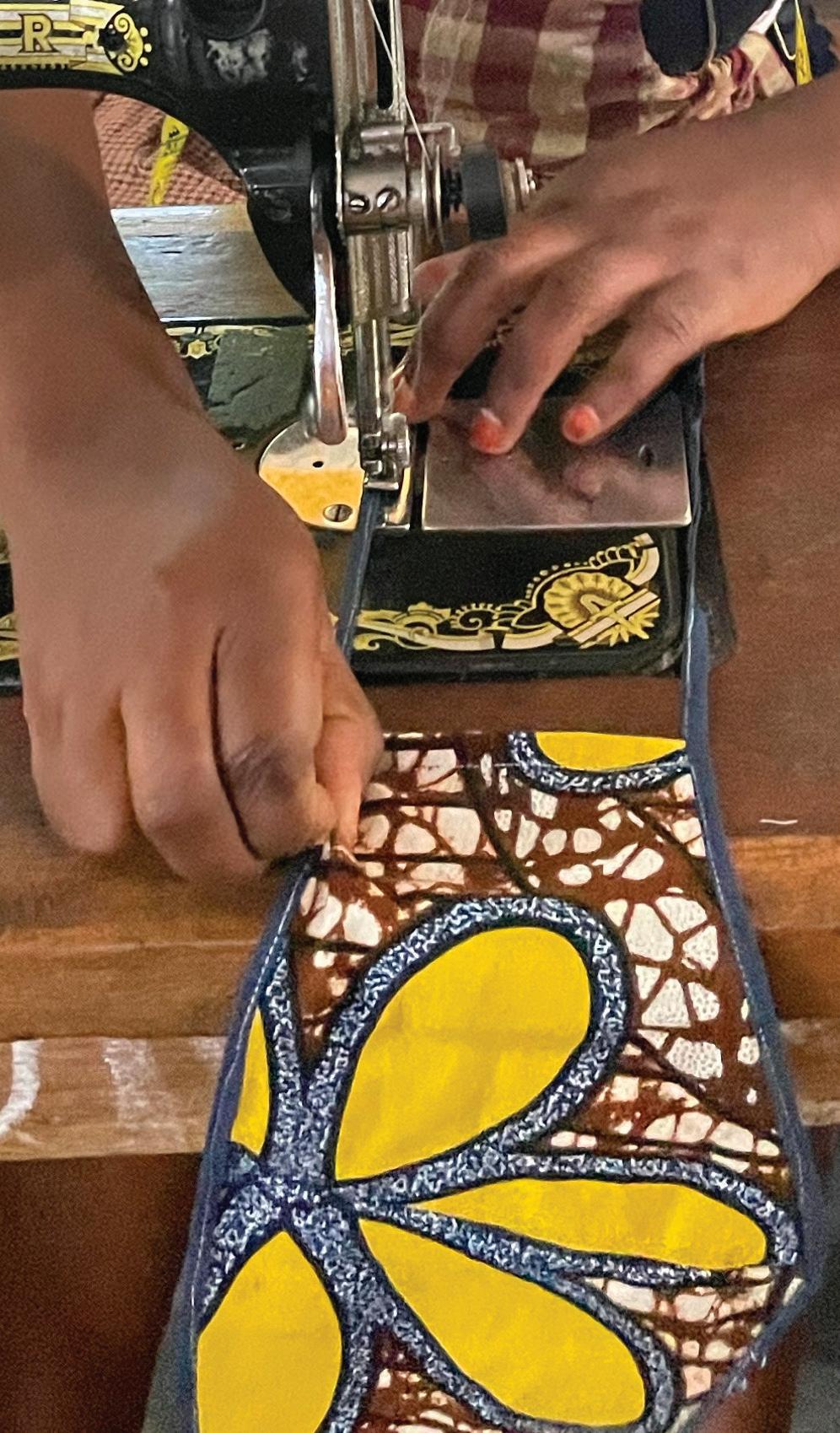
When I think of the fabric of the church, I imagine the act of weaving colorful threads to form a beautiful tapestry or the brush strokes that make a painting, offering a reminder of the value of the pieces that make a whole. I see the countless small tiles that are crafted together to form a unified mosaic image. Each thread, tile, or brush stroke is akin to the small, often unseen acts of mercy and love throughout our communities that build toward the vision God has for our communities and our world.
It is in the countless daily acts of faithfulness that we continue to pray as a church, "Lord, may your will be done on earth as it is in heaven." Often, we long for the loud thunderous boom that ushers in God's reign on earth. But, instead, we find that God works powerfully in the countless small ways infilling the whole earth.
The fabric of the church is made up of the strands of thread that represent care and commitment to one another,
each thread leading to neighborliness, sacrifice for others, and seeking God's will on earth. When two or three come together and form the Body of Christ in the world, the threads of the faithfulness of God's people come together to form the beautiful tapestry. God weaves the threads together to form abundant community and continual collaboration for the one purpose of bringing glory to the Father.
The stories you will read reveal a people transformed by the love of Jesus in their lives and for their community. Often, they share love in tangible ways that is a risk to the security, safety, and well-being of their own families and communities. Nevertheless, they give through their trust in the abundance of God. They trust that when you receive a gift from God, you keep it alive in the world by sharing it with others. Grace upon grace.
I believe such small acts of faithfulness are what the apostle Paul imagined when he prayed for the Christians in Ephesus—that “Christ may dwell in your hearts through faith, as you are being rooted and grounded in love ...” (Read the full quote to the left).
May the Lord deepen and widen our imagination of what He wants to do in the world ... and may He strengthen our embodiment of His love in the world.
4 2023 // ISSUE 1
OPENING NOTES
CONNECTION POINTS
A SPOTLIGHT ON CHILDREN
AROUND THE WORLD, NAZARENES AIM TO BRING WHOLE-CHILD CARE INTO ALL AREAS OF MINISTRY
Reporting by Marlen Soria, NCM Mesoamerica
Kanenungo, NCM Africa
Children are the focus in new programs that integrate care for children with other ministries. Below, read about how churches are holistically caring for children in three world areas, offering tools for young people to use in creating a new future.
NEW LIFE IN GUATEMALA
In Guatemala, in a community near the city of Quetzaltenango, one group of people survives by collecting and recycling plastic from the dump. Entire families are involved; parents bring their children with them because there is nowhere else for the children to go. Nearby, a church of the Nazarene, El Palmarcito, serves the community through a child development center located in the church.
Many members of El Palmarcito have been impacted by the child development center the church hosts. They’ve seen the impact a project like this can have on a community, and they themseleves were inspired to serve. Like the other child development ministries in the area, the new project will serve children and their families holistically, which means taking into consideration all parts of a child’s life. For this reason, the church members chose the name Neuva Vida: New Life.
To begin, volunteers connected with El Palmarcito to visit the dump once a month, bringing food, water filters (purchased through a partnership with Real Life church
in Indiana, USA), and training about the importance of clean water. The project has also provided rubber boots for protection while sorting trash. Relationships are growing, and the next step is to start educational tutoring. While most of the children in the community attend school, it is difficult for them to succeed because of the difficult work they do helping their parents at the dump. Holistic care includes finding the root of a child’s academic struggles and starting there.
The families in the areas have explained to the church members that no one has visited them before and that this is the first time anyone has shown interest in them.
ANOTHER WAY IN MEXICO
What started as a week of evangelism to children in Mezcala has become much more, explains Nancy Cardona, a Nazarene child development coordinator in Mexico.
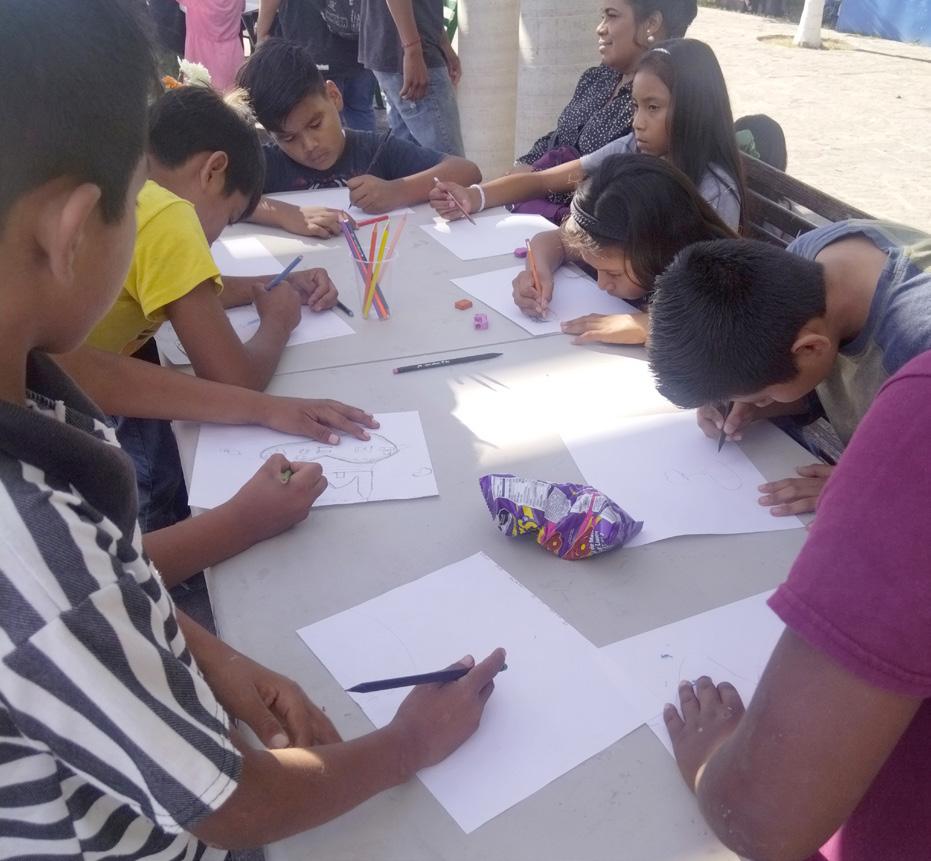

“The Mezcala Project aims to reach [entire] families for Christ through community work while offering a complete change for them as families,” she says.
Mezcala is a small, isolated community of only 600 or so people. In this area, children as young as 10 years are exposed to illegal substances. It is difficult to earn enough there to stay out of poverty, and many parents immigrate to the United States to try to find a way out of the cycle. The result is a large population of unsupervised young people without job prospects or reliable ways to buy essentials. The El Buen Samaritano Church of the Nazarene has felt a call to serve these children, opening doorways to alternatives.
“Bit by bit, many children have been opening their hearts and participating actively in the activities
5 NCM.ORG
and Simba
Photos courtesy of NCM Mesoamerica and NCM Africa
Holistic Child Development
that the church has offered them,” Nancy shares.

After that initial week, volunteers and staff from the church kept returning to the community, arranging for medical brigades, hair cuts, and school supplies. While these things are certainly needed, the volunteers also listen carefully, building relationships. Like the ministry in Guatemala, the goal is to care for children and their families alike and to care for them holistically.
STARTING A NEW STORY IN SOUTH AFRICA
Sfiso, age 44, has three sons with her husband; neither she nor or husband is working right now, and they often have to rely on their local Nazarene church, where Sfiso also volunteers. They live in an area of South Africa where the high levels of unemployment also mean more young people struggling with substance abuse. Like many others, one of Sfiso’s sons was exposed to drugs at school. The family was devastated when he became addicted to drugs. “That really broke my heart ...” she shares.
The Nazarene church that helps Sfiso and her family saw the great need in their community, and they opened a ministry with the goal of creating alternatives for young people struggling with substance abuse. Together with a child development center, which provides school supplies, meals, and educational support from grade school to high school, the church is pouring in to the
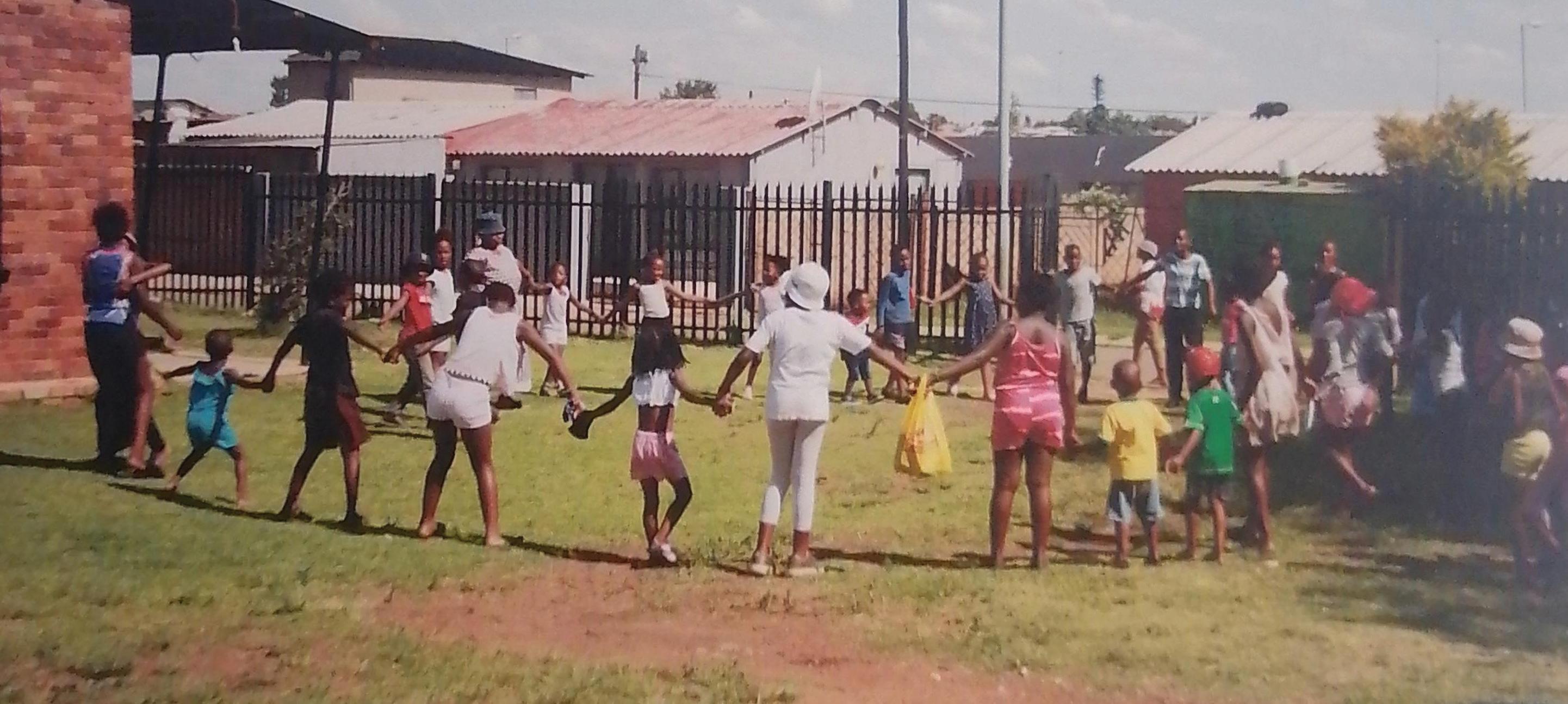
community’s youth. From providing nutritious food for children to counseling, life skills training, and referrals to rehabilitation centers, the church is incorporating a whole-person ministry. And as it does so, it is also becoming a beacon of hope to many young people who had thought there wasn’t any hope to be had.
Eventually, Sfiso’s son became involved with the church, where the church members helped him become sober. “I’m grateful for the center that the local church is having,” Sfiso says. “It’s very helpful. Many boys have stopped smoking, including my child, and have received Christ as their Lord and Savior.”
6 2023 // ISSUE 1
Q&A
WHAT ARE WAYS TO LIVE COMPASSIONATELY EVERY DAY?
“Living compassionately every day, especially during the war, means remembering that each person has her or his own story. It’s important to remember even without the war, but when you live under constant stress (doesn’t matter whether you stayed in Ukraine, left, or left and came back), emotions tend to run wild. The world, however, hasn’t turned black and white overnight and still has (for better or for worse, depending on the situation) gray areas. So yes, for me right now, one of the most difficult yet vital things about living compassionately is remembering that each person has a story.”
- Zee Gimon, Ukraine
(read about ministries in Ukraine on page 22)
“Listening to others carefully without prejudice helps us recognize others' struggles while we suffer together and find ways to alleviate the pain. Compassion means suffering together; God commanded us to love others as we love ourselves, and taking care of others shows God's love through me.”

- Marlen Soria, Panama
(read about child development in Mesoamerica on page 5)
“Compassion is an action word—what you do. If you want your neighbor and your neighborhood be transformed then get involved. Compassion is doing it the Jesus way: slowly, quietly, and daily."
- Stephen Gualberto, the Philippines
(read more from the Philippines on page 13)
7 NCM.ORG CONNECTION POINTS
COMPASSION THROUGH THE WORD OF GOD
1 2 3
Sometimes, the most significant barrier to living out compassion is not knowing how to start. What can we do to take the first small step toward serving others? Start by learning and reflecting using the prompts below, then challenge yourself to take action with what you have discovered.
REFLECT
Matthew 11:29-30 says, “Take my yoke upon you and learn from me, for I am gentle and humble in heart, and you will find rest for your souls. For my yoke is easy, and my burden is light.” Take some time to read through one of the Gospels and pay attention to the people Jesus spends time with and how He interacts with them. Notice the moments where Jesus moves toward people who are often marginalized and ignored. Who would Jesus be drawn toward in your community?
TAKE A STEP
Start asking around or searching for local people or oragnizations providing compassionate care in your community. Spend time praying for them. As you pray, you may feel led to a particular area. Reach out to them to find out more about how they serve and how you might be able to engage.
REFLECT AGAIN
Consider how it felt to take the first step. If you like to journal, write a few notes about your reaction to reaching out in your community. Consider whether you felt nervous, excited, or another emotion. Why might that be? Think about what other actions could stem from this one.

everyday compassion
C ONNECTION POINTS 2023 // ISSUE 1

9 NCM.ORG QUESTIONS? Email ncmi@ncmi.org or call 1-800-214-4999 DID YOU KNOW YOUR WORKDAY CAN HELP PEOPLE WHEN THEY NEED IT MOST? NAZARENE COMPASSIONATE MINISTRIES LEARN MORE ABOUT WORKPLACE GIVING via ncm.org/workplace-giving
WHY
C OMPASSION?
THE ACTIVE MINISTRY OF COMPASSION IN THE CHURCH OF THE NAZARENE

A Fast That Pleases the Lord
BY GUSTAVO A. CROCKER
During one of the first international NCM seminars on poverty alleviation, I was challenging the participants to mobilize as the healing hands of Jesus. A well-intended believer told me that social ministry was a distraction for the evangelizing work of the church—after all, Jesus Himself reminded us that the poor will always be with us. If that were true, we should stop trying to solve the problem of suffering and focus on evangelism.
I couldn't disagree more. The reality of the gospel is that it is good news for the whole person in the whole world. While Jesus did rebuke the disciples’ false solidarity in what they thought was a waste of money that could have been given to the poor, Jesus was not making light of the reality of poverty, oppression, and exploitation. The disciples were simply putting things out of context. What Jesus told them was that a true act of mercy and justice couldn’t be done in isolation from Him, the source of justice and righteousness. Besides, from His declaration of mission in Luke 4 to His description of the end of times in Matthew 25, Jesus placed the oppressed at the center of His mission, message, and ministry. His ministry model was to the whole person. When traveling across the villages and communities preaching, teaching, and healing, Jesus was moved to compassion because He saw the people harassed and hopeless, experiencing emotional, spiritual, and physical poverty. The last, the least, and the lost had a special spot in Jesus’ heart; the incarnate God called His disciples to see Him in those who were marginalized (Matthew 25). He challenged the religious practices void of solidarity, giving a contemporary recitation of the message given to the people through the prophet Isaiah in chapter 58.
It is interesting that in this rebuke to the religious symbolism void of solidarity, the Lord is encouraging us to address both absolute and relative poverty: spiritual and social poverty. He is asking us to work both in the alleviation of suffering (by sharing our resources) and biblical justice (by speaking up). The message of Jesus is a message of restoration—of God’s people with their Creator, and of God’s people to a full life the way He intended.

In the small Nazarene church in Guatemala where my parents found the saving grace of Jesus, the grace and compassion of Christ was not only preached in word but also demonstrated in deed. It was a church that was established to be with the poor and the lost. And it was also a church that, since its beginnings, had been established to minister to and embrace the poor while preaching and embodying holiness. That’s why I was thankful when my experience of a church that stands for the poor became part of the polity beyond a statement or a declaration. You can find it in the Manual of the Church of Nazarene (p. 394), an excerpt of which reads: (We) believe that Jesus commanded His disciples to have a special relationship to the poor of this world; that Christ’s Church ought, first, to keep itself simple and free from an emphasis on wealth and extravagance, and second, to give itself to the care, feeding, clothing, and shelter of the poor. Throughout the Bible and in the life and example of Jesus, God identifies with and assists the poor, the oppressed, and those in society who cannot speak for themselves. In the same way, we, too, are called to identify with and to enter in solidarity with the poor and not simply to offer charity from positions of comfort. We hold that compassionate ministry to the poor includes acts of charity as well as a struggle to provide opportunity, equality, and justice for the poor. We further believe that the Christian responsibility to the poor is an essential aspect of the life of every believer who seeks a faith that works through love. ...And that's why we are a compassionate church...

“ THE MESSAGE OF JESUS WAS A MESSAGE OF RESTORATION.”
11 NCM.ORG
Life On The Margins
BY DEIRDRE BROWER LATZ
Compassion is the essence of how our faith is shown in action. Treating people with dignity, generosity, and open hearts, minds, churches, and homes—each of these is welcoming and honoring others in the same way we would welcome Jesus. This is the shape of our Nazarene life. The Scriptures reveal Jesus as someone who declares good news through His love and care toward those that are unnoticed, lost, afflicted, outcasts, poor, hopeless, rejected, despised, and overwhelmed. And the Bible calls us—as God’s people—to display love by caring for the world and all who dwell in it; we are to be compassionate. We respond to the prophet’s call to recognize exploitation and oppression. We challenge those who abuse and crush poor people as well as confronting those who shorten the lives of children, destroy homes, and leave people naked and enslaved for their own gain. We join God’s mission of care for “the least of these”—because in this, we love Jesus the most. This, too, aligns with our deep Nazarene history: “Let the Church of the Nazarene be true to its commission; not great and elegant buildings; but to feed the hungry and clothe the naked and wipe away the tears of sorrowing … The gospel comes to a multitude without money and without price, and the poorest of the poor are entitled to a front seat at the Church of the Nazarene."
- P. F. Bresee
In Bresee’s words, we realize our heritage that is marked with holy love for those on the margins of society. Globally, we encounter people without food, water, clothes, homes, freedom, or hope. Some


people are so abused and soul-sickened that they turn to alcohol, drugs, pain medications, and more in order to hide their pain; some others struggle to find acceptance in society. How do we approach such needs and situations? We respond through compassionate actions, displaying God’s love for the people, creatures, and even our environment. Compassionate action changes lives. What does it look like? Years ago, our local congregation—a tiny, thriving, generous, hope-filled place—realized there were people in our city whose asylum claims had been rejected but could not return to their home countries because of the danger. Their lives were in limbo. As a congregation, we joined forces with other churches and offered evening meals, showers, washing machines, and beds for the night. And year after year, we continued extending such practical services. Another congregation became aware of issues with female bodies, including struggles with monthly cycles, shame, and embarrassment among some groups. The congregation worked with supermarkets and nurses, who gave their time to hold a monthlong “woman only” event. Dozens of women dropped in to talk to medical professionals, leaving reassured and aware that the church cares for them. Restoring dignity and being heard are ways compassionate action touches lives.

Magnificently, some senior women participated in training that focused around “what’s in your hand.” They realized they had many years of experience and great skills in mothering and nurturing between them. They opened the church for a warming café, and local residents who were on the margins of the community through disability or life-limiting illness began to drop in and find shelter and hope. The biggest thing they did was to talk with people about normal things. Word spread, and soon the café and then the church were full of people laughing and sharing life together, empowered by love to belong.
Another couple, lifelong church members, were devastated by the husband’s diagnosis with dementia. They started a carer’s café with tea, cake, music, and memories every Friday for any others in their shoes. What began with just the two of them and a friend has grown to more than 40 people. Creative, engaged compassion has changed their lives. Who are we? How do we align ourselves with God’s compassionate action in the world in service to Christ? Shaped by Scripture and our history, we open our eyes to the needs on our doorsteps, being open-minded about how God can use us. Compassion is who we are called to be: good news.
12 2023 // ISSUE 1
“ THIS IS THE SHAPE OF OUR NAZARENE LIFE.”
A Sacrificial Love
BY STEPHEN O. GUALBERTO
It has been three years now since the COVID-19 pandemic hit the whole world. The pandemic affected billions of lives globally with disease, death, debt, and distress. It has seriously complicated an already broken world. But in the midst of so much brokenness, we have seen many churches become hands and feet of Jesus, salt and light to the world.
In addition to the pandemic that hit us so hard, injustices around us— corruption, greediness, selfishness, hate, violence, crime, poverty, war, and many others—are on the increase daily. While many world leaders talk about peace and progress, the world is deeply divided. In our hostility to one another, we disagree on important matters and often don’t trust each other. In the Philippines, where I live and am a citizen of this archipelago, we are beginning to realize that what is wrong with our nation is not a political divide but rather moral and spiritual crisis. We need more than money to rebuild our cities, our homes, our families, our marriages, our schools, our business, our churches, and our government from the pandemic and other crises. We need more to preserve the next generation— our children and youth. We need the church of Jesus Christ to be once again more and more loving, living the love of God to the lost, the least, and the last.
We need to revisit our understanding of compassion. We need a rebirth of compassion in the church.

Compassion is to suffer with another person—the poor, the oppressed, the marginalized, the hurting. To have compassion means more than just feeling sorry or sad for those who are hurting or have needs. Having compassion moves you to get down where they are in the midst of their need, to suffer with them in the midst of their pain, to lift them up from their brokenness, and to defend them in their desolation.
In the story of the prodigal son, we read that “when father saw his son, he felt compassion with his son, the father ran towards his son, embraced him, and kissed him” (Luke 15:20). It is beyond feelings or emotion. It is more than being sorry for what people are going through. Compassion is not a program nor a project. The Bible teaches us that compassion is when you see the problem, you are moved by the need to act on it. You go out to where the problem is, stand in the gap courageously, bring hope to the people, and get your hands dirty to help someone. Jesus Christ is the only perfect model of compassion. Across the Gospels, we see Jesus identifying Himself with the poor, the marginalized, and oppressed, acting on their misery to bring them to better heights in life. Matthew 14:14 tells us that Jesus had compassion on the great crowd following Him, so He healed the sick and then fed the five thousand. His compassion did not stop there. Jesus had the same compassion on another crowd and so fed the four thousand (Matthew 15:32). When Jesus saw the two blind men in Jericho (Matthew 20:34), He was filled with compassion and healed them on the spot.

For our Lord Jesus Christ, compassion was not a feeling; it was a commitment, a sacrificial love, denying Himself in order to get involved with hurting people. Real compassion moves from feeling to action.
As the church, not the building but the believers, is the Body of Christ, we are to live, love, and lead like Jesus Christ. We are to intentionally exemplify compassion. And as we make Christlike disciples in the nations, compassion is not an option but rather the lifestyle of every believer. It should be our heartbeat and our DNA of being disciples of Christ.

“WE NEED A REBIRTH OF COMPASSION IN THE CHURCH.”
A CHURCH THAT
MOBILIZES
COMPASSION DURING TIMES OF CRISIS — AND BEYOND

2023 // ISSUE 1
PHOTOS COURTESY OF NCM MESOAMERICA
MOBILIZES
More than 100 million people have been displaced worldwide by conflict, famine, and disasters—a number that represents women, men, and children made in God’s image. As a crisis drags on, the attention and support given to them often ebbs. And yet, local Nazarene churches all over the world practice compassionate response that grows instead of waning, adapting to the needs, contexts, and communities. The stories that follow are just a few of the many examples of the way God is using the church to serve with love.

A GLOBAL REALITY
More people than ever are living displaced from their homes. Some have been displaced within their home country. Many others are on the move to other countries, seeking safety and well-being.


2023 // ISSUE 1
Local churches have become waystations of hope for people on long journeys.
A CHURCH OF HOPE
Many Nazarene churches have already seen the impact of conflict and displacement in their communities, and they are mobilizing in response. Ministries in the name of Christ provide everything from food and shelter to trauma training and children’s education. It is active love in the name of Christ, no matter the circumstances.
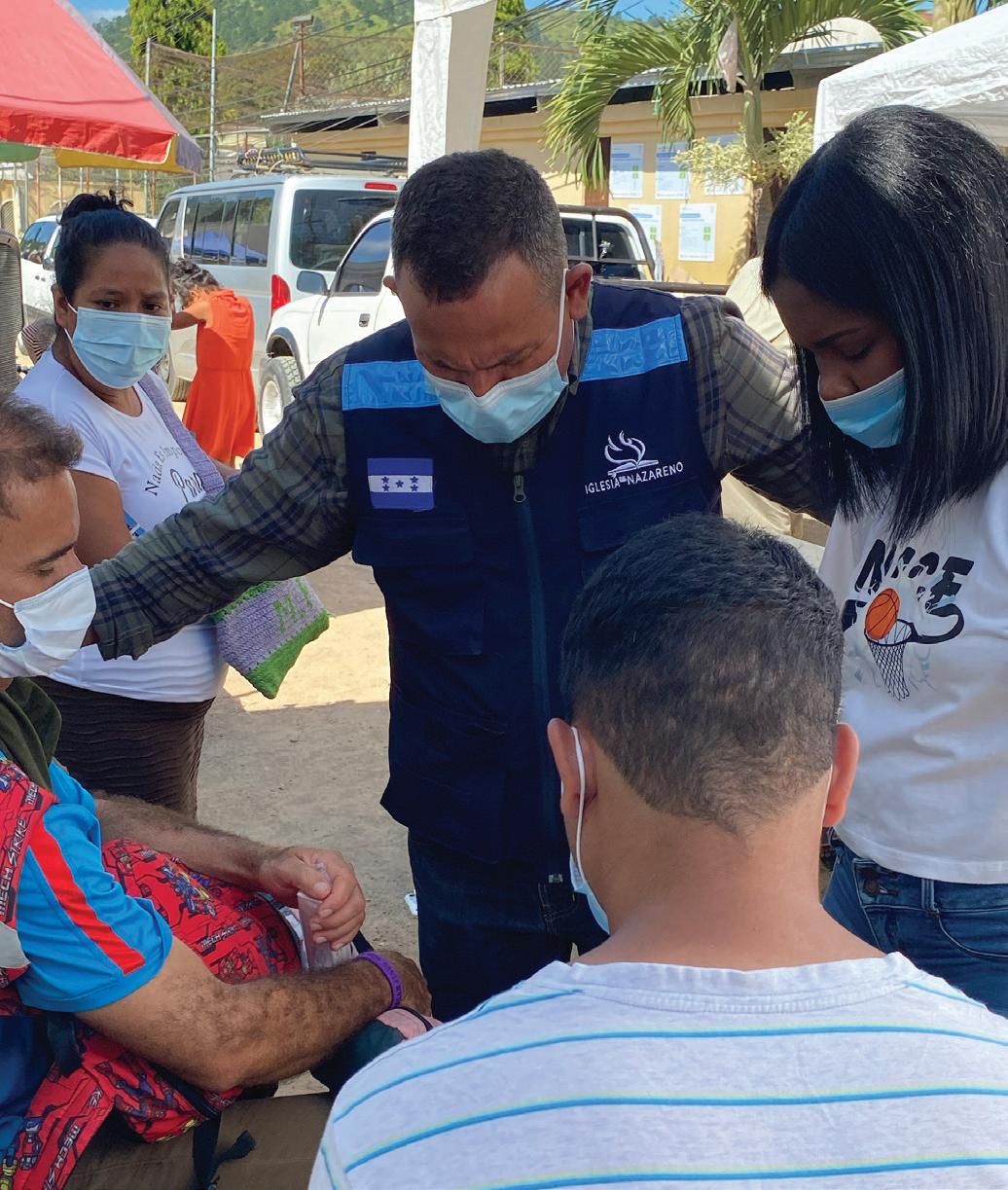
 Nazarenes around the world are both the carers and those cared for.
Nazarenes around the world are both the carers and those cared for.
LOVE ALONG THE WAY
BY DHARIANA BALBUENA, NCM MESOAMERICA PHOTOS COURTESY OF NCM MESOAMERICA
Ray*, a 26-year-old business administration student, and Ed, a 22-year-old criminology student are residents of Ecuador and Colombia, respectively. They left their native country, Venezuela, years ago to study and work. Ray had heard that part of his family in Venezuela had been stripped of their property—even his grandmother had ended up on the street. Heartbroken, Ray and Ed decided to journey to the United States in the hopes of lifting their families out of the unexpected situation.
Ray and Ed departed from Venezulela on September 29, 2022. They crossed the Darien Jungle in Panama, where thousands have lost their lives. The jungle is one of the most dangerous migratory routes in the world. It is also the only road that connects South America with North America: 130 kilometers (80 miles) of dense vegetation, suffocating heat, rivers, and swamps. Migrants from more than 50 countries—from regions as far away as Africa and Asia—cross through this region daily, desperately seeking to reach the United States.
After surviving the challenges encountered in Panama, Costa Rica, and Nicaragua, Ray and Ed arrived in Honduras. But they were tired and worried about having exhausted all their resources to stock up on
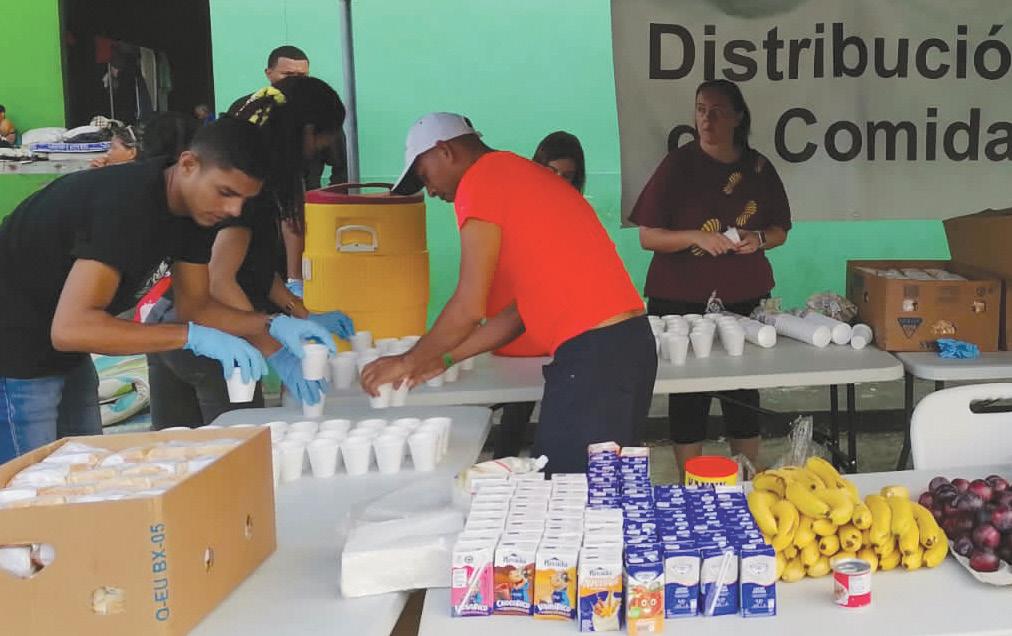
food. On the edges of the migration route in Honduras, they saw a white and blue tent bearing logos for the Church of the Nazarene and Nazarene Compassionate Ministries. Here they realized that migrants were being served with medical care, food, and prayer. Ray and Ed saw a glimmer of hope, and they were relieved to receive food and prayer in this tent. Although they did not stay long, it was long enough to feel grateful and to remember those logos printed on the tent.
When they arrived in El Salvador, the next country on their journey, they were approached by women who
identified themselves as members of the Church of the Nazarene. Indeed, Ray and Ed were able to distinguish and recognize the same logo that they had seen in the tent in Honduras, now on the shirts the women were wearing. The women shared the Word of God with
18 2023 // ISSUE 1
“TODAY, I AM CROSSING BORDERS OUT OF NECESSITY, BUT TOMORROW, I WILL CROSS BORDERS TO SHARE GOD'S LOVE.”
THE MINISTRIES SERVING THOSE FORCED FROM THEIR HOMES ACROSS CENTRAL AMERICA
them. Ray and Ed immediately confirmed what they had suspected, that this was the same church, for they felt the same love. These women also supported them in any way they could that day before the men continued onward. This is how they knew that the grace and love of God was with them, the young men explained.
THE JOURNEY CONTINUES
Next, Ray and Ed arrived in Guatemala. After 15 days of sleeping on Sixth Avenue, a very busy and crowded place in the heart of the city, Hugo, a young Guatemalan who used to walk there to pray for the migrants, approached them. Hugo greeted them with the intention of getting to know them and supporting them. When they were receptive, he invited them to eat, and they continued the conversation. They asked him if he knew of any Christian churches, specifically the Church of the Nazarene.
"For me it was a great impact," Hugo said.
He was surprised at their request for that specific church, so he asked them, Why that one in particular? They told him about their experiences with the Church of the Nazarene along the way. Hugo was happy to hear how God had used the church in the journey of these young people; in fact, Hugo was a pastor with
the Church of the Nazarene. Hugo visited them every day while discipling them, and every week they went together to the Church of the Nazarene in Guatemala City, where they were warmly welcomed.
Soon these young people, helped by the church, had a place to stay. They were able to obtain their temporary permit to work in this country and get jobs, which sustained them for two and a half months, even helping them save money to continue their pilgrimage.
Ray and Ed felt blessed by God and the Church of the Nazarene. Full of joy, they also began to return to Sixth Avenue to pray and share the Word of God, a message of hope, with other migrants. Others began to visit the church, too.
Truly the transformation of these young people has been genuine. Ray states that he wants to be like Hugo and the brothers of the Church of the Nazarene, who in each of these Mesoamerican countries serve those who are vulnerable and needy by opening their doors to foreigners and sharing God's love with all of them.

"Arriving in the United States, I will look for a way to find my family, the Church of the Nazarene, to continue growing in faith," Ray shared.
In the same way, he speaks about his new desire to be a missionary, because just as he received the Lord in his heart, now he wants others to have the opportunity to do so.
“Today, I am crossing borders out of necessity, but tomorrow, I will cross borders to share God's love, and that is thanks to the example you have given me,” Ray said.
A GROWING MINISTRY
Since October 2018, many migrants like Ray and Ed have been cared for and served by the Church of the Nazarene in Mesoamerica through Nazarene Compassionate Ministries. NCM began serving this region after hearing from different
 A chain of Nazarene churches links people to hope and love across Central America.
Whole families might migrate together, seeking a life that isn't defined by poverty or hunger.
A chain of Nazarene churches links people to hope and love across Central America.
Whole families might migrate together, seeking a life that isn't defined by poverty or hunger.
platforms and media in 2018 about the mobilization of thousands of Central American migrants who were heading north in a caravan in search of new opportunities.
Those who lived along the route were not ready for what was coming. This massive migrant phenomenon was new for the Mesoamerican countries, but the truth is that God has equipped us as a ministry along the way with the love, tools, and alliances necessary to begin and continue serving. Initially, those who were migrating were only Central Americans, but now people from different regions of the world were part of the migrant phenomenon.
As a ministry, we did not imagine the way God would use us, but we were willing to be His light in the midst of so much affliction, in the midst of so much need. Even now, we realize the wonderful plan of God, by remembering and telling about everything we have lived and learned in these years of walking with them, from the first day we began serving and meeting their needs with what we had available until today.
You can imagine the panorama from the first day we connected with the first migrant caravan: children, youth, adults, and people with disabilities, each painting a picture of extreme fatigue, minor injuries, battered feet, hunger, and dehydration. The people who had left their homes
realized the need to tell their painful stories but were also fearful of exposing themselves to danger or the possibility of being returned home. At the same time, they longed to find refuge in God, whom some knew while others doubted.
A NETWORK OF LOVE
As compassionate ministries in our region, we always promote a holistic approach in all the responses we give, which makes a difference in the lives of many migrants along the way. While not everyone was on board, many responded to the call to serve the stranger in the name of Jesus, with love and without prejudice.

At the beginning in 2018, we had an organized response only in Guatemala and Mexico, since they were the points visited by these migrant groups. Then the reality changed, and the pilgrimage came from South America. Soon, countries like Honduras undertook the task of joining the response, forming a national NCM ministry that could attend to the needs of migrants from different points of view, without neglecting to serve the locals. The ministry in Honduras has become very strong and is recognized among organizations and the immigration department itself.
In 2022, countries like Panama and Costa Rica began to mobilize teams likewise to provide care to migrants
2023 // ISSUE 1
Children make up at least half of all displaced people across the globe. Creating safe spaces for children is an essential part of ministries.
out of the commitment of congregations there. An example of this is the Church of the Nazarene in Río Abajo, which for 40 uninterrupted days served food and managed to find space in the migration compound to perform healings, pray with the people, and hold events with the children. They have also provided lodging and food for families who have decided to rest and return to their countries of origin.
Today, through the Church of the Nazarene in Mesoamerica mobilized by Nazarene Compassion Ministries, we have assisted more than 20,000 migrants with medical services, legal advice, prayer and evangelism, food and shelter. The work has been challenging, but we continue forward. We are inspired by the Lord's love as well as being moved by so many results and stories of transformation not only in the lives of migrants but also in the lives of those who at one time or another have been involved in this lovely answer.
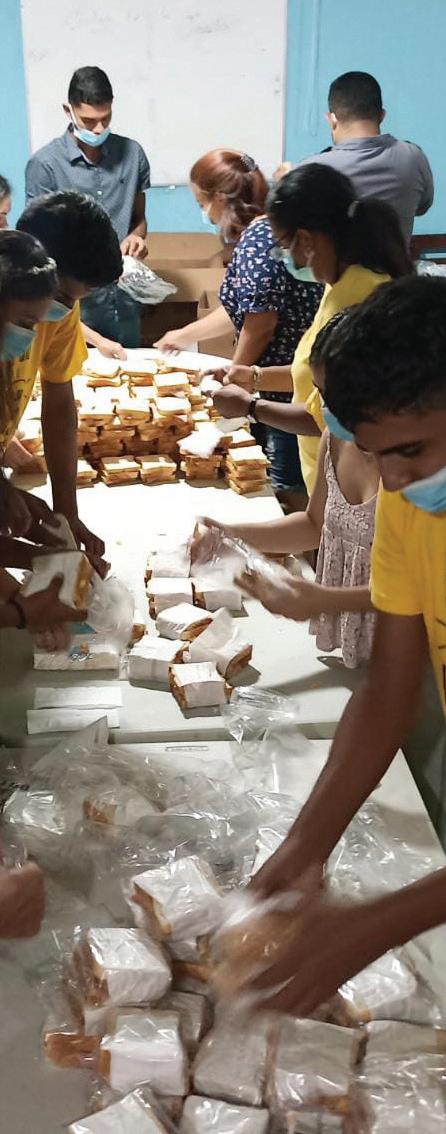
That is the case of Nury Chacón, wife of a pastor and member of the Church of the Nazarene in Coronado, Costa Rica, who together with her church supported a family of Venezuelans for weeks until they continued their journey north. Nury tells us, with tears in her eyes and a broken voice, the great emotion she felt when she realized that as a ministry of compassion we are connected between countries. We serve as a great network to assist migrants.
Nury contacted me to find out if I knew anyone in Honduras willing to support her friends—the Venezuelan family her church was supporting in Costa Rica, who now found themselves with nothing to eat in this new country. I quickly put them in contact with our national NCM coordinator in Honduras, Rexcembrik Aguilar, who without much thought responded, mobilizing an hour away to bring bags of food, clothing, and blankets for this family. Shortly, I received a message from Nury, this time to tell me about her impression and the quick response, as well as asking me about contacts in Guatemala and Mexico. Thank God Nury’s family in Costa Rica was able to accompany, advise, and support a large part of their friends’ journey.
In the Mesoamerica Region, we have many challenges and needs. But in the midst of each one of them, we learn and grow as we prepare and equip ourselves to continue serving in the name of our good God. Without fear of being wrong, I can say that the work among migrants has been the one that has unified us the most as a ministry and has allowed us to feel like a single team. More and more congregations and leaders who deeply understand what it means to love your neighbor as yourself are joining the response. We continue to grow, we continue to advance, we remain attentive to the needs that arise.
*Names are changed for safety.
Volunteers across Mesoamerica have served more than 20,000 people.
UPDATES FROM UKRAINE
CREATING OPPORTUNITIES TO RESPOND IN LOVE
BY CRYSTAL GIBBONS | PHOTOS BY GENADIY NAUMOV
As medical volunteers from Global Care Force visited churches and villages across Ukraine over the fall and winter of 2022, they prayed that God would help them find at least one person in each location that would be the right fit for an inaugural trauma-care training.

Global Care Force, an organization founded by Dr. Gary Morsch that sends medical volunteers to crisis areas around the world, was partnering with Nazarene Compassionate Ministries to provide basic trauma training for people who are committed to helping those around them and training others in this valuable practice. The first group of 12 trainees gathered just across the border from Ukraine in Przemysl, Poland, in late January, eager to help the most vulnerable people in their communities or those coping with trauma within their own families. After a year of war, the attendees themselves were also dealing with sustained trauma. Through the training, Pastor Volodymyr Masyuk found that he was dealing with the same things as those he pastors.
"Some time ago, I started feeling not myself, I was thinking that something was wrong with me,” Masyuk shared. “I tend to think trauma is somewhere else, not in my life. But I am starting to see the complex trauma that I have experienced. This week was
2023 // ISSUE 1
like an emotional MRI. The time here has given me some tools to start to deal with my trauma."
According to the World Health Organization, nearly 70 percent of the world's population has experienced
Yurii Hymon will take the training back to Lviv, Ukraine. “Some are going back to Ukraine, some are staying in Poland, but any place that God will send us, we are ready to listen and to help those we encounter," Hymon said. “We want to be a safe space for everyone around us."
at least one traumatic event in their lifetime. Trauma affects our emotional response, our mental health, and even our physical health. A series of traumatic events over a period of time, known as complex trauma, holds our brains hostage in the flight, flight, or freeze response mode without allowing our bodies to return to a relaxed state. In Ukraine, an entire nation has experienced complex trauma on many levels and will take decades—if not generations—to heal.
Valentina Berezniak joined the training from Kazatin, Ukraine. "I want to have more tools to help those around me understand that trauma can be healed,” she explained. “Having a place where you can show your pain can give you a feeling of hope. It will make our healing as a society better, because healing is contagious.”

At times, small acts of love can seem pointless in the face of war. But, although this nationwide trauma is vast and can be overwhelming, those who are trained will become like little pebbles thrown into the sea. Though they are small, the ripples will eventually touch every corner of Ukraine.

“WE MAY HAVE A CHALLENGE OF FINANCIAL SUPPORT, BUT WE KEEP GOING.”
Small steps to healing trauma can make a large impact now and for generations to come.
Giving families the tools to heal complex trauma has the potential to help children process their experiences.
NCM.ORG/UKRAINE
InUkraine
and all over the world, people are responding to great needs. Those who have stayed in the country are showing love as needs arise. From trauma training to distributions of food and essentials, the church has mobilized to care for those who need it most.

Love can be many things. In a country experiencing war, active love might become listening to someone else's story, or it might be helping distribute boxes of food to help bridge a gap.
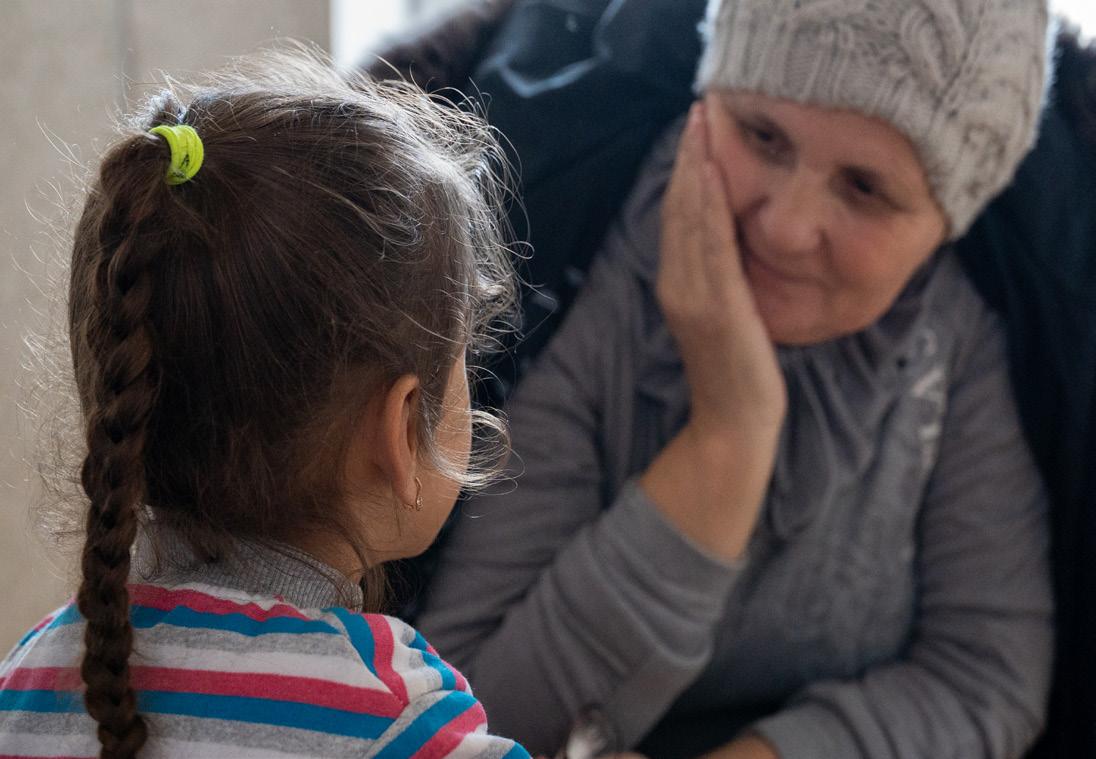

24 2023 // ISSUE 1
Sometimes, love is a food distribution. In war-torn cities across Ukraine, people have lost jobs, pensions, and savings as records become a casualty. At churches, they find necessities and fellowship.




Sometimes, love is a safe spot for children. Kids clubs have long been spaces where children can go for support, tutoring, relationship-building, and more. Now, those clubs are more important than ever.
And sometimes, love is being in communion. Churches in Ukraine have continued to meet to worship, gathering together in the name of Christ and learning of needs, celebrations, and prayers.

25 NCM.ORG
THE HANDS AND FEET OF CHRIST
VENEZUELANS FIND HOPE IN COLOMBIA
 BY SANDRA MILENA PEÑA, NCM COLOMBIA
BY SANDRA MILENA PEÑA, NCM COLOMBIA
Little children, let us love not in word or speech but in deed and truth. (1
John 3:18)
There are many Venezuelan families arriving week after week to Colombia in search of refuge, help, and the hope of starting a new life. Many flee from the violent situations and inequality at home, but above all, they flee from hunger. If they have the financial means, families arrive by bus. But those who have enough are few.
In reality, the majority come by foot—with a backpack, their newborn babies, wives, husbands, uncles, grandparents, and anyone who can get out. They carry only what they need to survive, hoping to find help along the way. Tulio, who left Venezuela with his family, shared that it was not an easy decision to leave home.
“We left everything in Caracas, in Maracaibo, in Valencia,” he says. “Many of us leave even our souls: wives, husbands, children, parents, siblings, friends, our homes. The homeland.”
The journey begins at the Simón Bolívar International Bridge, the most symbolic border point between Colombia and Venezuela. According to figures from Colombia Migration, some 70,000 Venezuelans cross the bridge on foot each day. Of these, five percent do not return to their country. After the bridge comes three days of walking before reaching the Picacho— part of a paramo, or an alpine ecosystem above the tree line, that spans more than 550 square miles. This is the place most feared by Venezuelan migrants, who come from coastal regions and do not know this beautiful and dramatic landscape. On the paramo, they suffer intense cold and very strong winds.
26 2023 // ISSUE 1
Across Colombia, Nazarene churches are responding to those who have made the journey. From providing support in hospitals to partnering with organizations who provide immigration aid, they are working together with those who have come in the name of Christ.

CARE DURING COVID-19
In addition to the socioeconomic and political situation in Venezuela, the COVID-19 pandemic had a radical influence. Just as it came as a surprise for us in Colombia, it surprised those migrating from Venezuela, too. In order to avoid the spread of the disease during the first months, national and international transit was restricted, and the confinement of the population was chosen as a preventive measure. The acceptance of these measures represented a serious challenge in sectors where a high percentage of the population lives in slums or popular urban settlements with so many people and low access to public services, food, and health. Nazarene churches saw these challenges, too; how could they serve?
A significant percentage of the Venezuelan population works in the informal sector where they face unsafe conditions and have little protection. The pandemic
After understanding the needs, members of the church contributed to the purchase of items such as diapers, clothes, shoes, blankets, and more. The church was able to deliver items required to meet the basic needs of those who were living there, bringing a moment of hope in the midst of the pandemic.

When the church visited the community again, the group gathered details about those who were living there, returning regularly and establishing further connections as well as sharing the Word of God.
further complicated the situation, restricting work possibilities, which increased the needs considerably.
All these facts led us to question the church’s role while facing such a complex time and so much need. The Hechos 29 (Acts 29) Nazarene church took action thanks to a statement on Facebook and the diligence of the pastor regarding a great need of the Venezuelan migrant population in the village of Fagua. In this small village alone, there are more than 50 families in a state of vulnerability and extreme poverty.
THE JOY OF PARTNERSHIP
When people move away from their countries, needs arise that make their stay a little more complex. Many of the Venezuelans who arrive in our area do not have documents, nor legal permits, which are important to be able to access a formal job, health services, and schools for children, among other things. And we as a church wondered: How can the church help at this point? We understood that we were not going to make it on our own, that we needed help to further
27 NCM.ORG
Ministries grew as the needs became clear to each local church.
“THERE ARE GOOD PEOPLE WHO WANT TO HELP IN TRUTH AND HEART.”
Children can begin to grow, learn, and thrive after a traumatic journey.
PHOTOS COURTESY OF NCM COLOMBIA
reach the population, and that together we could create a solution to the bigger problem rather than just supplying primary needs.
Partnership was key. While NCM provided experience, training, and support, many other organizations were also engaged in the work. So the local Nazarene church took action to contact local mayors in the area, governmental organizations, and foundations. These organizations have been the essential units in finding the solution to this situation thanks to their management and availability. They have been great allies and help for the immigrant population. As a result of this support, more than 200 families have been legalized. Now, they have the necessary documents and permits to work, with access to school for their children, access to free health care, programs for pregnant mothers, and government aid programs for mothers who are heads of households. Many have decided to stay in Colombia; others have decided to return to their country. As they go, they take with them spiritual tools to continue the journey with Christ.
SUPPORT FOR THE SICK
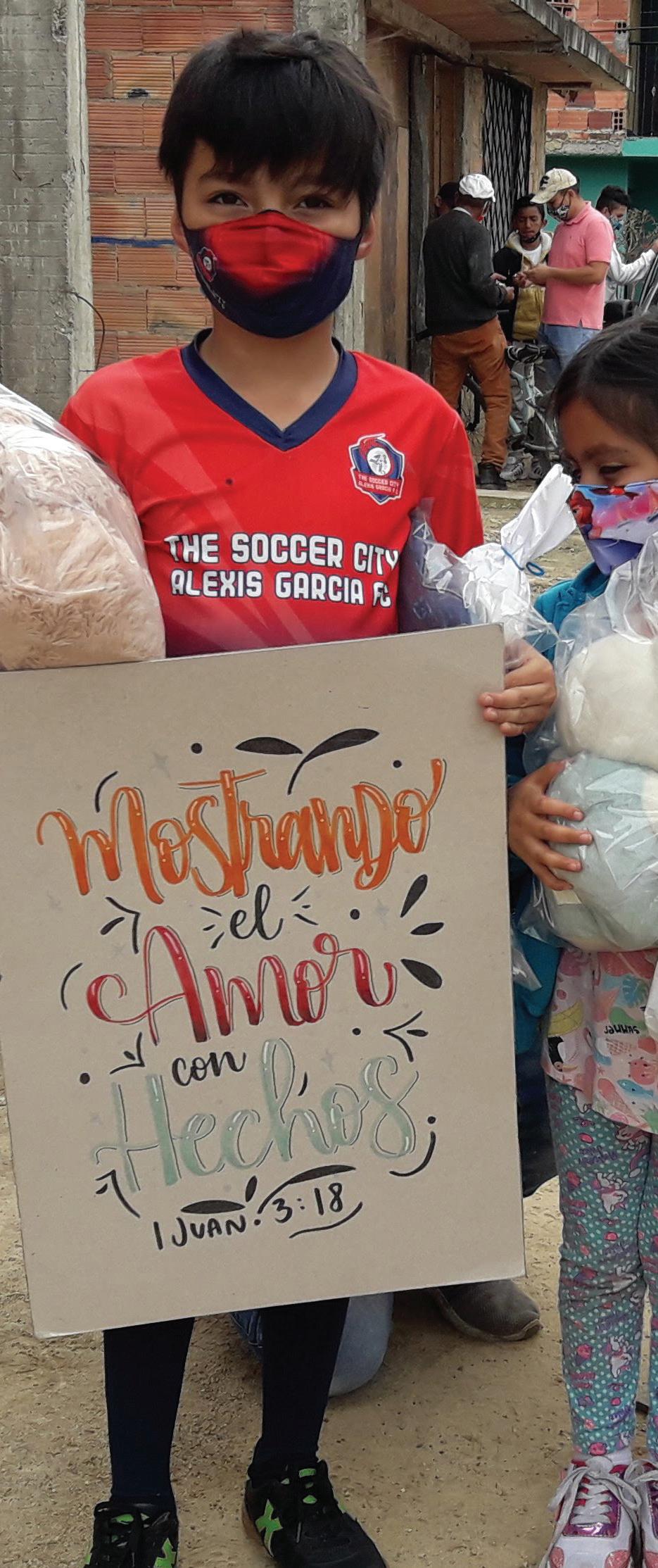
One church has also begun a ministry in the Antonio de Chia Hospital, where every week volunteers take snacks, blankets, and newborn baby clothes to more than 60 new Venezuelan families. While they are there, they pray for all the sick, for the administrative staff, and for the medical and general services of the hospital. This project focused on expectant mothers has given us the opportunity to bring the word of hope for four years.
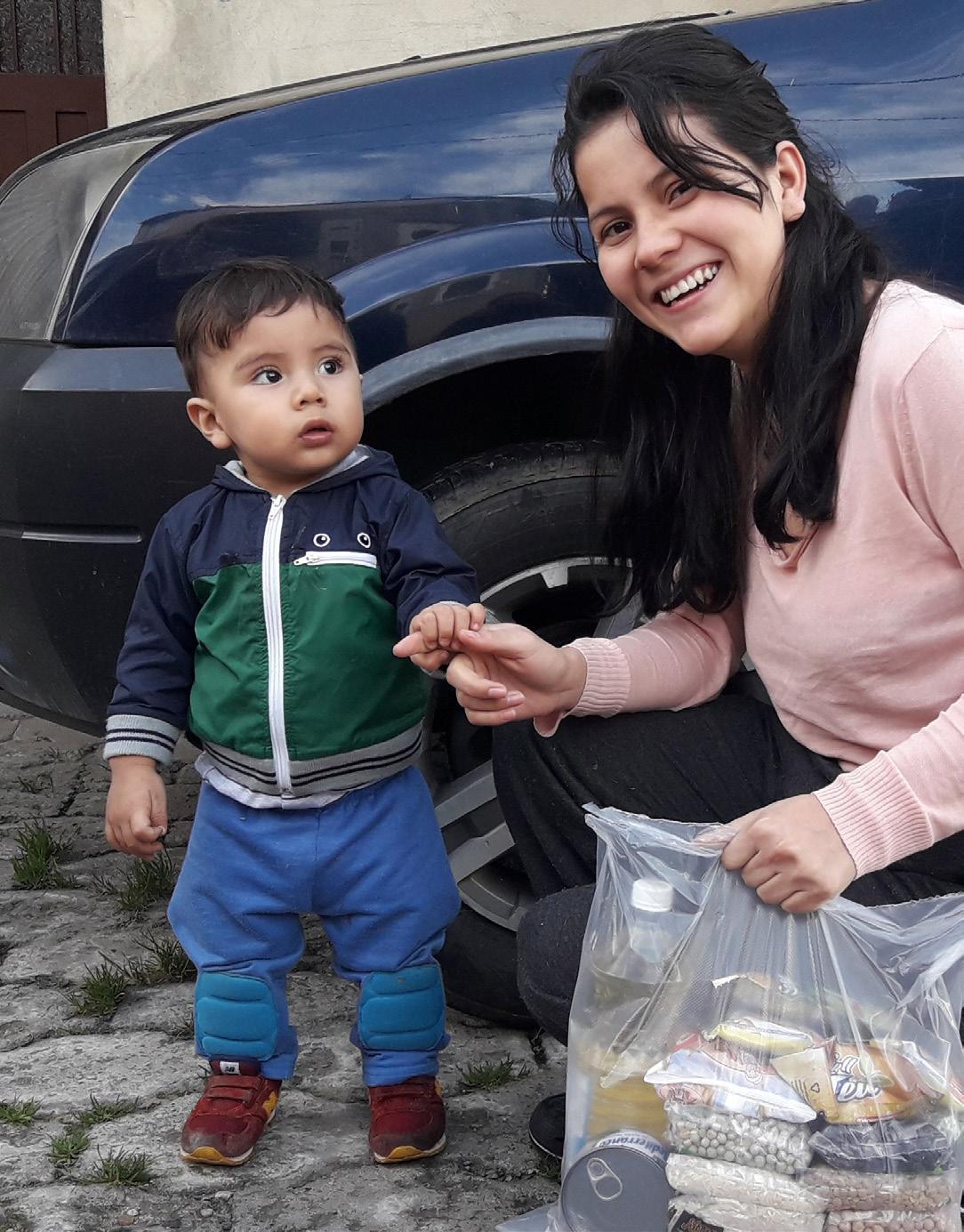
28 2023 // ISSUE 1
Nazarene churches partnered with many other organizations to serve.
Adriana, a 25-year-old Venezuelan woman, was abandoned by her partner in the middle of her pregnancy. She found herself living on the street, dependent on people's charity. She used drugs to avoid the hunger and cold she encountered every day. Adriana arrived at the hospital emergency room during one of the visits we made; from the moment she approached our table, she was touched by God’s love. She began to visit every Saturday, and we were there for the birth of her baby. Her life has been totally transformed. God has given her a new spiritual life but also a new physical life. She is healthy and has a school for her daughter, a job, a nice roof to live under, and the best of all, Christ in her heart. She currently serves in one of the churches.
“Thank God I got sick and got to the hospital,”
Adriana shared. “I want to help other Venezuelan friends in this hard situation and tell them that God exists and that there are good people who want to help in truth and heart.”
Indeed, as servants we are convinced that God is working in the life of each family that arrives to our nation and also in our lives. We have seen the love of Jesus in every need. God has provided many people and many organizations willing to unite in love to support the migrant and refugee communities in Colombia. Our mission is to continue strengthening ourselves in Christ and to continue serving and supporting all refugees—not only from Venezuela but from any part of the world.

29 NCM.ORG
29 NCM.ORG
Many families have been able to build new lives through the support of the churches.
Planting TheSeeds of Hope
How agriculture is transforming lives in Burundi
BY DANA FRANCHETTI
On a warm afternoon in the small community of Kagazi, Burundi, a group of women rest in the shade and look out over the vast stretch of farmland in front of them. Known as “light mothers” by their neighbors, these women are leading the way in an integrated project designed to help their community thrive through economic and agricultural development.
Burundi has one of the highest rates of malnutrition in the world. According to the World Health Organization, more than percent of children under the age of five suffer from acute malnutrition.
Sylvane has been a light mother since the early days of the project. She says growing food has improved her family’s health dramatically.
“My kids were sick, always sick,” Sylvane explained.
She and the other light mothers are changing this reality for their children by putting into practice the skills they are learning from this integrated program. And as individuals and families become more resilient, the community changes, too.
BUILDING CONFIDENCE
NCM in Burundi partners with local Nazarene
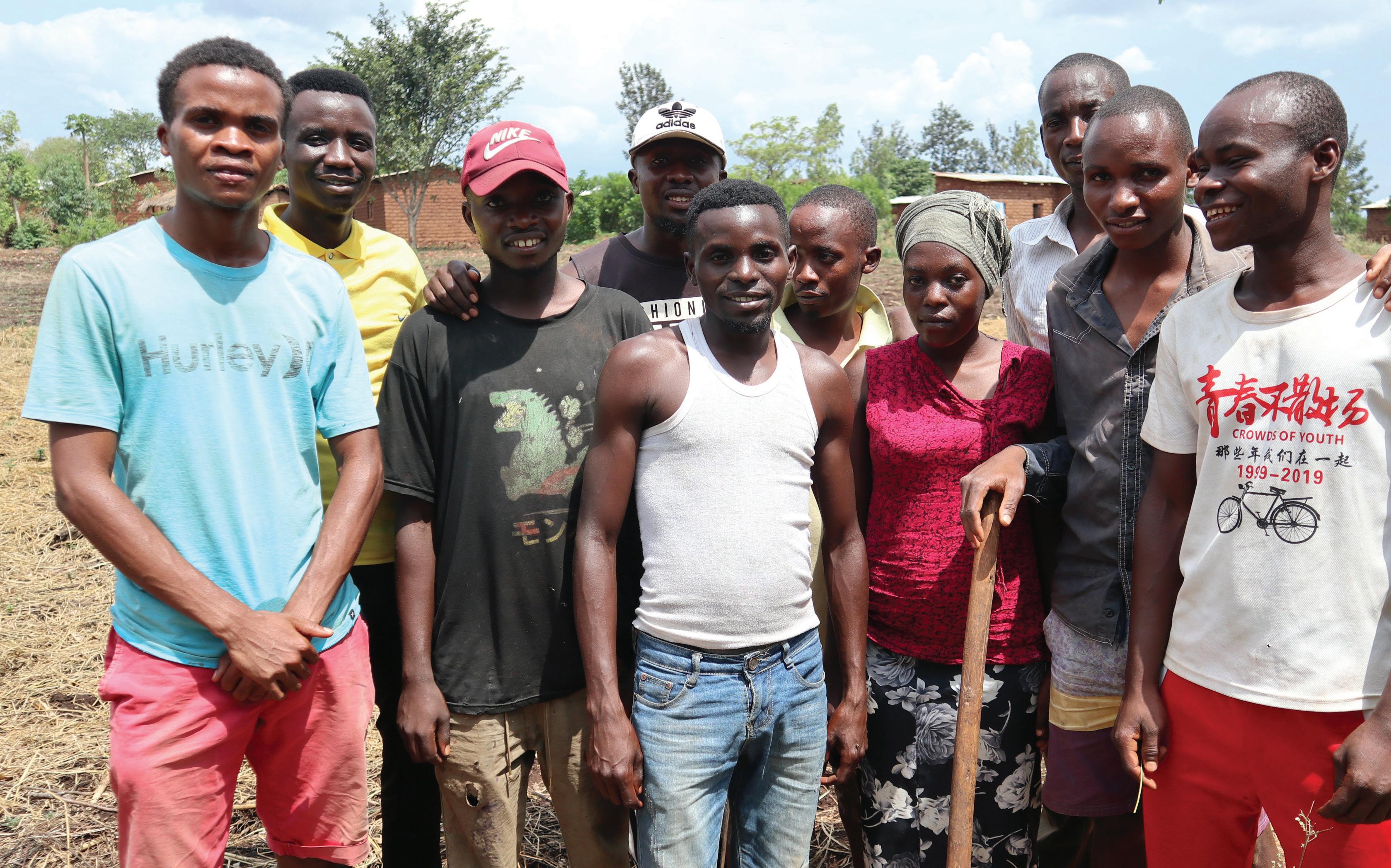
churches to organize community members into associations—groups of primarily women and young adults who want to provide for their families, learn better agriculture and business practices, and help marginalized groups in their communities access better food options and possible job opportunities. These community members are organized into groups of around 30 people each, based on where they live.
Due to the impacts of a warming climate, farmers face new and complex challenges when growing produce. Africa Nazarene University worked with NCM Burundi to create training opportunities on agricultural practices, teaching association members to grow food in their personal gardens as well as larger land areas. The skills members learn through these training opportunities give them the ability to harvest enough food successfully. More crop production allows them to sell the extra harvest at local markets, which means members are providing for their families through the food they grow and the income they earn.
“When we learned how to grow vegetables, the kids are healthy,” Sylvane said. “I learned that even though we are vulnerable women, we can
30 2023 // ISSUE 1
go to the fields. We can get seeds and grow [food ourselves so our families' lives can improve.”
Sylvane is not the only one who has gone from seeing herself as a vulnerable person to someone who can impact her community. Flauncy, a 28-year-old mother of three, grew up in the village of Bugar as a child who was orphaned. She attends the Nazarene church in her village and is a member of an agriculture association. In partnership with the local Nazarene church, light mothers in this particular association found that with the increase in food production and income from selling produce at the market, they could begin a ministry to provide food, housing, and education for the children in their community who are orphaned due to war and illness.
“I remember the love and care I had from someone who wasn’t even related to me,” Flauncy said. “So, I have to take care of others as well. I don’t have much, but I can help in this way.”
She has two biological children, ages 1 and 3, and one child she cares for who has been orphaned. She explained that when she and her husband saw how their agriculture efforts were providing for their family, it was a natural next step to begin providing for the needs of other children in their village.
Janviere, a light mother from another village, has been a leader in her community for many years. Underneath the shade of the mango tree outside of her home, women in the community often come together to share meals and play with their children. As an influential leader, she has been able to help other women see the benefits of participating in this model. She explained that growing up in this village, she has seen firsthand how the land and climate have changed.
“The land of today is not the land of the past,” Janviere said. “We have to learn new ways. ... I have joy because I have knowledge. I get to see the food grow well. Seeing the progress is wonderful.”
Janviere explained that practices like covering new plants with straw and dried grass to protect them from the harsh sun and sowing seeds methodically in rows instead of scattering them randomly have entirely transformed the impact agriculture has had on their village. The success of the new skills has also increased confidence, and more people feel ready to take on the task of farming.
FROM FOOD TO FINANCES
The holistic agricultural model is easy to reproduce in other parts of Burundi or other countries in Africa. As the associations become more established, members can pass on their knowledge to other community members who can form their own associations. This method creates a pathway for younger people to receive
mentoring, knowledge, and hands-on training in their agricultural and economic endeavors.
Ozean, a mother of three, serves as treasurer for her association. Her children were feeling the pain of malnutrition. She attributed one primary reason for this—a need for more education about resources available around them to provide whole and nutritious meals for their families.

“When we train other mothers, we show them the importance of good nutrition,” she explained. “We show them that life starts when the baby is in the womb, so you must take care even then. You need to eat three times a day, [including] fruit and vegetables, with good food. So, babies and moms can have good health.”
In addition to agricultural training, members of the associations learn financial skills, like good business practices and methods for accounting and accountability. Through the income members collect from selling produce in the markets and dues paid at each meeting, every association also serves as a savings group. Through the communal funds, associations provide small loans to individuals and families to grow businesses. By investing
Local businesses grow and provide more jobs throughout the community through training in good business practices.
31 NCM.ORG
“I HAVE JOY BECAUSE I HAVE KNOWLEDGE.”
PHOTOS BY JEREMY MOSER
their loans in chickens, for instance, people have food, eggs, and meat to both use and sell. Manure from animals is also repurposed as fertilizer.
“My dream is to save more money so we can grow this business and help our neighbors who are in need,” Ozean shared. “We have learned so much, and now we can pass it on to help our community grow.”

GROWING TOGETHER
The benefits of holistic agriculture for community members go beyond food and business practices. The members have grown spiritually as well. Notably, many of the young men in the group have realized the power of working together. They have used this opportunity to grow in their faith and develop essential life skills.
Elijah, a 25-year-old association member, rents a house with 10 other young men in the village. They moved to the village for the opportunity to participate in the agricultural project because there were no jobs available in the city where they lived. Their Nazarene church in the city pooled resources to provide a way for the young men to make the move, receive training, and start their businesses. Their experiences have become much more than simply learning how to farm well; their participation is also an opportunity for these young leaders to help develop the agricultural work, expand other leaders, and grow together in their faith.
“We pull together as a team,” Elijah explained. “We live together. We know each other. We are friends who are family, and as we work together and live together and study God’s Word, we have grown so much spiritually.”
The power of working together in a group, learning, praying, and living life together has been a theme throughout the project's duration. The prospect of cultivating the land and managing shops in the marketplace is impossible to do by oneself—there wouldn’t be enough time or resources for each person to do this work individually. However, by joining
forces, groups can tackle large-scale projects together and share the burden of financial responsibility and workload.
“Before, my life was very different,” Elijah said. “I was alone without work. Now I have my brothers. We experience this together and grow together.”
When association members like these young men work together, they learn about each other’s lives and their neighbors' joys and struggles. This has led members of the associations to pray together and grow
32 2023 // ISSUE 1
“WE HAVE LEARNED SO MUCH, AND NOW WE CAN PASS IT ON TO HELP OUR COMMUNITY GROW.”
Women and other marginalzied people experience economic freedom through their new businesses.
spiritually, which is precisely what local churches hoped would happen. As this initiative continues to develop and reproduce, village leaders and NCM Burundi leadership have high hopes for the future of these communities. Claude, who serves as the coordinator for NCM in Burundi, explained that his hope, vision, and prayer are always to glorify God. People can more readily consider their spiritual lives when physical needs are provided for.
“The vision I have is for transformation,” Claude said. “As people see that they get enough harvest, people will be fed, kids will go to school, and people will go and sell in the market. ... We are responsible not only for the spiritual needs of our community but also the physical. Hungry people don’t hear the gospel.”
NCM.ORG/BURUNDI
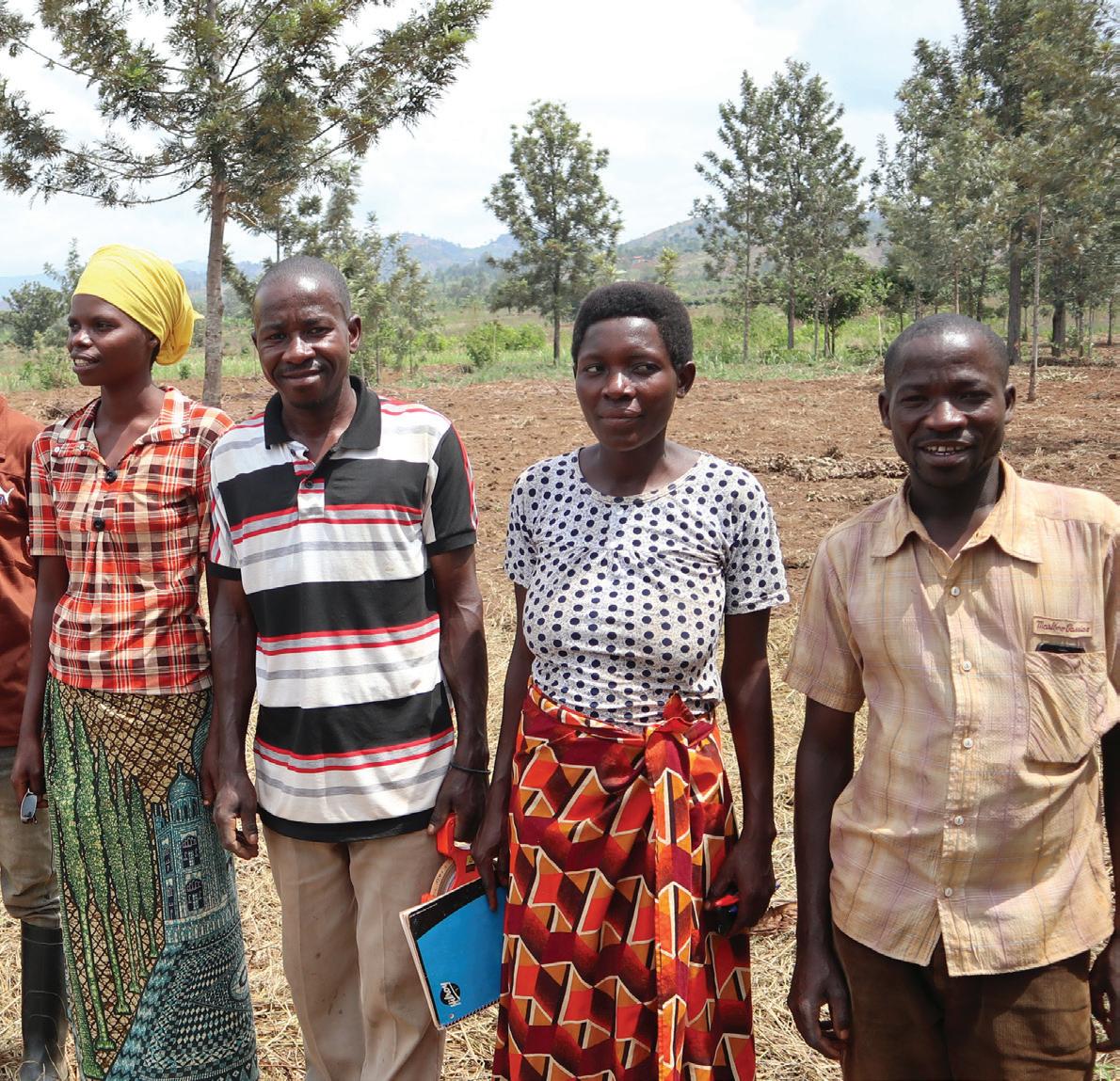
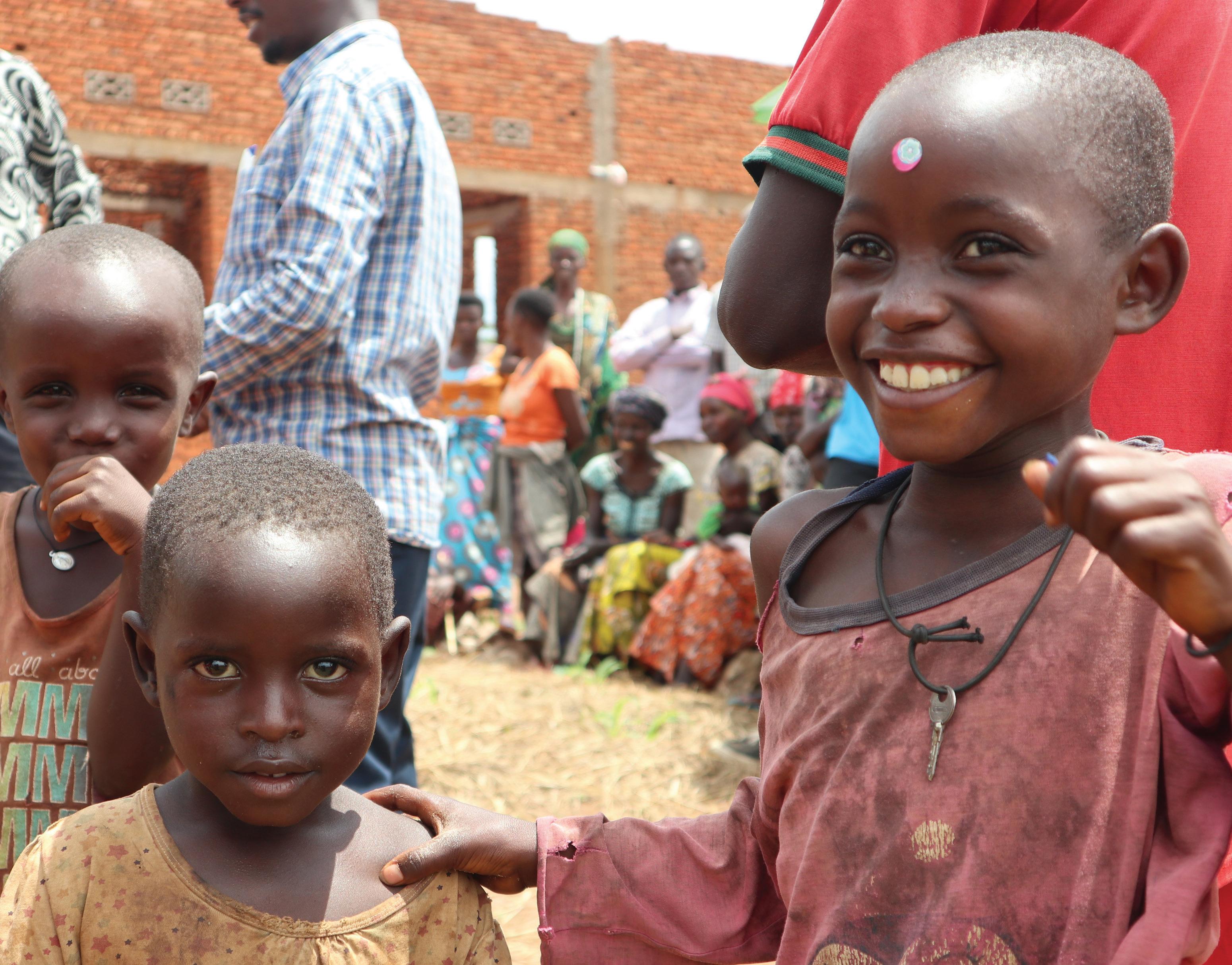 In the midst of life-changing access to jobs and food, new friendships and deep relationships with God are flourishing.
In the midst of life-changing access to jobs and food, new friendships and deep relationships with God are flourishing.
LOOKING BACK, WALKING FORWARD
WORDS AND PHOTOS BY GINA POTTENGER
After a devastating disaster like the earthquake that hit Nepal in 2015, life can sometimes become even harder for those caught in poverty. But for Tulashi and her family, the earthquake was a transformative turning point for the better.
Prior to that earth-shattering April day, Tulashi and her family were barely eking out their existence on their sunny, hillside farm in the village of Ubu. That’s why her husband, Ram Kumar, had gone to find work in East Asia, leaving Tulashi alone to raise their two children and care for his father. Even with the money he sent home, only one of their children could afford to attend school.
“Our financial situation was quite poor,” Tulashi explains. “We did not have money to spend on paper and pencil.”
Today, everything is different because, for the past eight years, Nazarene Compassionate Ministries has walked alongside families like Tulashi’s. As community members rebuilt their lives, NCM in Nepal joined them and worked toward something more—a present that is secure and a future brimming with hope.

THE AFTERMATH
Tulashi was digging a new well under the April morning sun when the 7.8-magnitude earthquake struck.
Her two children and her father-in-law were outside, too, which probably saved them from injuries: their home sustained serious damage and became unstable.
The massive earthquake killed an estimated 9,000 people, with some fatalities as far away as India and Bangladesh. More than 16,000 people were injured, and 2.8 million people were displaced. In Kathmandu alone, 600,000 structures were damaged or destroyed.
In the rugged, mountainous Sindhupalchowk District, some communities lost 100 percent of their structures. In Ubu, fewer buildings were leveled, but many, like Tulashi’s home, were seriously damaged. “Almost everyone … prepared our food and ate outside of our house,” she says.
In those first weeks, Samuyel and his wife, Asmina, who also live in Ubu, remember shortages of food and safe drinking water that sparked steep price increases. The sharp inflation was disastrous for families who were already struggling. A number of national and international organizations converged on Nepal during that first year, bringing emergency supplies, medicine and medical treatment, rice and cooking oil, and temporary shelters like tarps and tents. And—just as quickly—most of them left again.
34 2023 // ISSUE 1
Eight years after Nepal’s earthquake, life has changed for the better
But people do not recover from major disasters like an earthquake or a hurricane as swiftly as the news cycle moves on to the next big story. Community members face a yawning stretch of years to rebuild their lives, long after the larger world has forgotten. Thankfully, for the people of Ubu, there was a Nazarene church in their community. That connection created a pathway for NCM Nepal staff to visit Ubu to assess the residents’ needs and help them develop a recovery plan.
After consulting with community leaders and residents, NCM in Nepal implemented several programs delivered with and through the local church: a child development center to support the children’s education; self-help groups, locally called samuha, so that residents could save money together for loans to start income-generating activities; and training to teach residents critical skills in home gardening and livestock rearing, as well as effective small business practices.
OVERCOMING A HISTORY OF DISCRIMINATION
Working together toward common objectives brought a significant change to the community, say Samuyel and Asmina, members of the Nazarene church. Before the earthquake, the village experienced ongoing conflicts between neighbors, Samuyel explains.

“Four or five years back, there was no religious tolerance in our village,” Samuyel says. “There was discrimination among the people in the caste system.”
Ubu (sometimes spelled Umbu) is the birthplace of the Ubu ethnic people group—one of Nepal’s 100plus ethnic groups. The village is also home to the Ubu people’s distinct religion, with a regionally significant temple that draws worshippers from miles around. Yet, people of various religious beliefs and social differences have settled here. While caste-based discrimination is illegal in Nepal, generations of unconscious practice and attitudes do not transform overnight.
The church committed to modeling a different way. “We do not care about caste,” says Asmina, who leads the center and the samuha. “We walk around with everyone.”
As NCM staff guided church members and the community to solve some ongoing problems, such as improving the safety of their water supply, then opening the center for all the families, people understood the church did not only help its own members or Christians but was ready to help everyone. They witnessed the church living out Jesus’ command to love their neighbor.
“Most of the people in the society realized that there should not be discrimination among people,” Asmina explains. “They realized that we can stay together, eat together, and walk together.”
EMPOWERING PEOPLE TO BUILD A FUTURE
Tulashi was among those who were impressed by the developments in the community and wanted to join the samuha. But her father-in-law, Amal Lal, who is a priest in the Ubu people’s religion, continued to view their Christian neighbors with suspicion. So, her family watched and waited. Slowly, as the activities grew community cooperation, peace replaced conflict.
“Noticing all these things, the ward chairman and other honorable people of the village realized this program to be a good one,” Samuyel says.
Even Amal Lal changed his mind. When Asmina personally visited Tulashi’s home to invite her into the samuha, Amal Lal reversed course, encouraging his daughter-in-law to join. The samuha members meet monthly to discuss problems in the village and sort through possible solutions. They keep records of the members’ deposits, loans, and repayments. If any member fails to attend meetings regularly or to contribute their required deposits, the group charges them a penalty, explained the area NCM coordinator, Manoj*. Tulashi also enrolled her children in the center, where Asmina and other staff teach and assist the
35 NCM.ORG
Children at the new child development center receive hope and care.
"WHEN WE RECEIVED THAT SUPPORT, WE FELT LIKE GOD HIMSELF CAME AND HELPED US."
students with their homework for two hours after school.
“There have been many improvements among the children,” Tulashi adds. “Not only the children—I also got much support.”
NCM in Nepal chose Tulashi’s family to receive incomegenerating resources in the form of a pig and a loan for pig feed. The pigs earn the family fifty to sixty thousand Nepali rupees (more than $350 USD) selling one pig. Tulashi and other beneficiaries also received training in livestock rearing, agriculture, and more. Through the instruction, Tulashi explains, people learned what needed to be done to be successful. Through selling her pigs, she was able to buy goats and poultry, too, which generate even more income. She also has beehives and an expansive, lush garden where she harvests mustard, cauliflower, squash, and many other vegetables and herbs. They also built a beautiful, spacious, two-story home, which provided more room when they welcomed a third child into their family.
After seeing that Tulashi had become stronger and more capable through NCM’s programs and support, Ram Kumar went abroad again to work. The couple now feel secure enough to dream for the future. Their plan is for Tulashi to meet her family’s day-to-day needs through her entrepreneurial activities, allowing Ram Kumar to save his earnings for their children’s future higher education. Tulashi grins as she remembers how different things were in 2015.
“Since this organization came here, happiness came into my life and to my family members,” she says.
A NEW TINDHARA
Driving through the center of Tindhara village, a few hundred miles from Ubu, anyone who was there in the weeks after the April 2015 earthquake would be hard pressed to recognize it now.
Back then, just one building remained standing— barely—when NCM Nepal staff rumbled into the village 10 days after the devastating quake with trucks bearing hundreds of bags of rice and bottles of cooking oil. NCM was the first aid to reach the village. The vehicles had struggled

for hours to navigate around mountains of rubble that had fallen into the roads. When they finally reached the remote village, they found everything reduced to dusty, broken bricks strewn with torn and soiled clothes alongside ruptured bags of rice mixed with the debris—all ruined beyond use.
People sat in the sun, listless and weak from hunger. Sleeping outside, having lost livestock and food supplies, some told the team they’d eaten nothing until NCM staff arrived that sweltering late spring day. Tindhara resident Saraswati was with her family when NCM arrived. “At that time, we were sitting here and there, [when] someone came and gave us food, like rice,” she remembers. “When we received that support, we felt like God Himself came and helped us.”
What a difference eight years can make. Today, the village is completely rebuilt with new homes and new gardens thick with a diversity of vegetables and herbs. The mountain air is broken by bleating goats and cackling chickens or crowing roosters. Children and teenagers stroll down the central dirt road on their way to school—their hair still wet from washing—wearing bright, clean school uniforms and carrying backpacks bulging with textbooks and school supplies. “When the church provided me support, they did not discriminate against me based on my religion,” Saraswati says. “They helped [everyone equally].”
Residents say life in Tindhara is even better than before the earthquake, thanks to the safety nets like financial savings and food production methods that have unleashed the potential and resilience of the entire community.
THE CHURCH COMES AND STAYS
Life had already been difficult before the earthquake, says Tindhara resident Surya Shrestha. Few people in the village knew how to garden, and those who did only grew potatoes and radishes or some garlic. People were so hungry
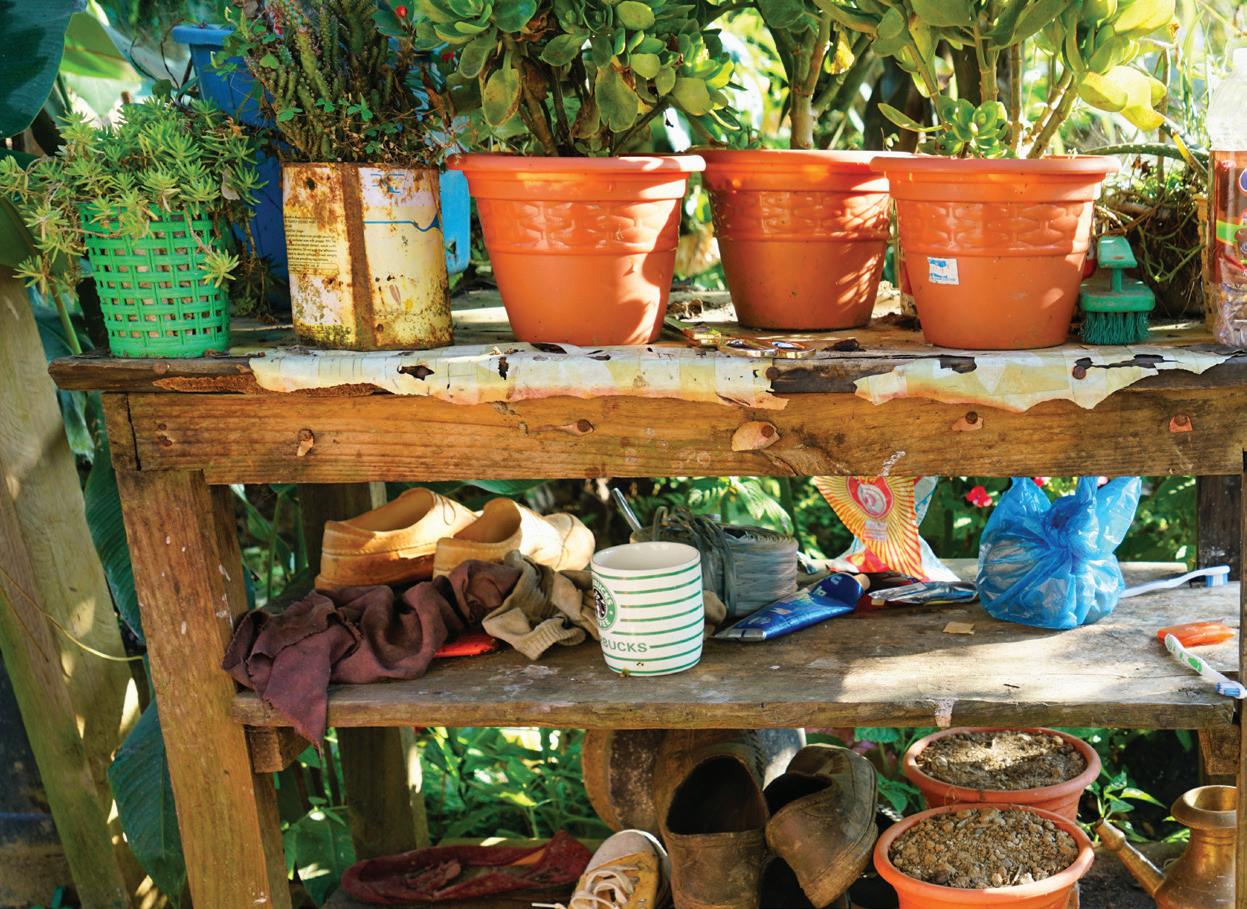
36 2023 // ISSUE 1
Gardening skills allow opportunities for families to provide food for themselves and the community.
that sometimes they stole food from their neighbors’ gardens during the night. Surya’s husband, Pujan, is a weaver, but he barely made enough from selling carpets to feed his family. Her sister, Saraswati, who lives across the road with her family, recalls that even before the earthquake, her children would cry over not having school supplies.
The earthquake pushed families from struggling to being homeless, hungry, and desperate. Many groups brought emergency food and short-term supplies to alleviate the urgent needs in communities like Tindhara. But once those needs were met, people needed to move from receiving food to receiving the resources to grow or buy their own food, rebuild their homes, earn income, and educate their children. That wasn’t going to take weeks. It was going to take years.
NCM Nepal staff learned about the plight of Tindhara through a young Nazarene named Tirtha in Kathmandu. Tindhara is his home village, where many of his family members still live. Through Tirtha’s connections, the staff opened a child development center, helping parents organize two samuha, self-help groups like the ones in Ubu.
Saraswati and Surya enrolled several of their children in the center, which provided them with school supplies, uniforms, tuition and exam fees, and even warm clothes for the winter. The supplies were often enough to share with their siblings who did not attend the center. Then the women joined the samuha, in which all the members contribute 50 Nepali rupees per month, loaning one another the funds to invest in self-sustaining, income-generating activities.

Before the earthquake, people had skills but could not buy what they needed to apply their skills to incomegenerating activities. Sometimes people asked friends or family members for money to buy yarn or a loom or a goat. Now, neighbors can grow as a community through the savings group, alleviating the pressure for these informal loans.
“Now, we are in samuha and we can take a loan easily if we need some money,” Saraswati shares. “In
this way, people got support and help. We do not have to go to every neighbor’s house requesting money.”
TINDHARA REBORN
Today, with help from loans, Saraswati and her husband enjoy the morning air and the company of neighbors as they weave carpets on a porch-front loom. They sell their carpets to a shop in Kathmandu that gives them the equivalent of $50 for each piece. Like most other residents since NCM came, they also tend to a large, prosperous garden and a herd of goats for additional food and income. “No one steals from their neighbors anymore,” Surya adds. Across the road, Surya cooks with her older daughter, Prabina, 17, in the second structure they recently erected for social gatherings or to eat. Pujan processes yarn in front of their home to be weaved later on their indoor loom. Their oldest son is away at college, and Prabina is studying agriculture, inspired by a female agricultural expert whom NCM brought to help the community learn how to raise kitchen gardens. The couple are proud that their children will be the first in their family to pursue higher education; Pujan only made it as far as eighth grade, and his father, who lives with them, only made it to third. With the confidence she gained from leading the samuha, Saraswati ran for a political position in the village and was elected. She has big dreams for how to use her new role to make life better for everyone in the community. “I used to fear talking in front of the people,” Saraswati says. “But slowly, I realized we should not always fear. We should overcome fear to move ahead.”
Although the NCM projects have officially come to an end in Tindhara, the knowledge, skills, confidence, and resources remain to empower people in building lives that are even better than before. People have respect for Saraswati, who is already using her voice to continue changing things for good.
37 NCM.ORG
37
Women grow in friendship and stability through savings groups.
“SLOWLY, I REALIZED WE SHOULD NOT ALWAYS FEAR. WE SHOULD OVERCOME FEAR TO MOVE AHEAD.”
Overflowing with New Life
BY SHARON TIGGA, NCM EURASIA PHOTOS COURTESY OF NCM IN SRI LANKA
After 26 years of brutal civil war in Sri Lanka, a new era of peace, reconciliation, and development began in May 2009 when the conflict ended. But in a small village called Iruttumadu, people were left with the worst scars from the war. The village was largely destroyed, and healing seemed impossible.
Many of the villagers returned after living displaced by the conflict for years. As they resettled in their community, these survivors faced extreme challenges in nearly every area of their lives. Iruttumadu is an isolated village in the northern province of Sri Lanka, and the people there received limited support or assistance from the government or any humanitarian agencies.
“In the past, before the final stages of the civil war, it was easy to live here. ... After the resettlement, we have nothing,” Dhitri*, a community member, says. “If you could come to help us now, we will learn to help ourselves, and you will not need to come and help us again.”
Dhitri’s longing to rebuild is shared by many others in the village. Together with Nazarene Compassionate Ministries Lanka (NCM Lanka), the village launched a fiveyear project beginning in 2017 to transform the community.
This project aimed to restore hope and transform lives through a holistic and sustainable approach that addressed everything from clean water to finances. Now, at the culmination of the project, the transformation is clear.

TRANSFORMATION FOR CHILDREN
For many of the villagers, children were—and are—a priority. Since the war has ended, children could grow and thrive in a new, trauma-free environment. Chandra, a long-time community member, has six children and six grandchildren. During the war, his wife became ill and died because they didn’t have access to a hospital. The family had to live in a camp for displaced people for many years before returning to Iruttumadu.
“We have gone through enough suffering, but my greatest hope is that our children won’t have to go through the same,” Chandra explains.
The focus on children has improved education for all of the village children, ranging from grade school to high school. Through the project, children receive holistic care—addressing, mental, educational, nutritional, and social needs—in a safe environment. Before, many children dropped out of school because of the distance
38 2023 // ISSUE 1
Local churches partner with NCM to help create stability in the midst of rebuilding after war.
In Sri Lanka, A Whole Community is Transformed
they had to travel. NCM Lanka also collaborated with Helping Hands to provide bicycles to students to continue their higher education. Besides education, the project also emphasized strengthening and improving safety of children in the village. Trainings and policies were translated into the local language, making it possible for community members to create child-safe spaces and become well-versed in child protection.
HOPE FOR THE FUTURE
For nearly three decades, the youth of Iruttumadu came of age under the shadow of war. It was difficult for them to hold on to hope, ambition, and faith. Rudra is 28 and has two children—he was married in a refugee camp. He has spent years living through falling shells and the extreme inflation post-war.
“Because of the fighting, I couldn’t take my exams, so I have no completed education,” Rudra says. “And after that, there were no more opportunities to study anything.”
There are many stories like Rudra’s, and those who had lost so much began to build peace and develop skills together. Young people meet daily on a sports field, playing volleyball or gathering in the evenings. The field used to be dotted with mines; now, it has
“I am without a husband; after joining the project I learned I can survive on my own,” she shares.
been reclaimed for a hopeful future thanks to the generous donation of land from a family who lost their eight-year old daughter to the war. Her father, Kasun, had been saving an acre of land for her.
“My daughter is gone,” Kasun explained. “Let other children in the village enjoy what she has left behind.”
The close interaction with the young people that Kasun made possible led to the formation of a youth committee, which offers emotional support as well as job skills guidance. Through the connections of NCM Lanka, young people could enroll in vocational training courses.

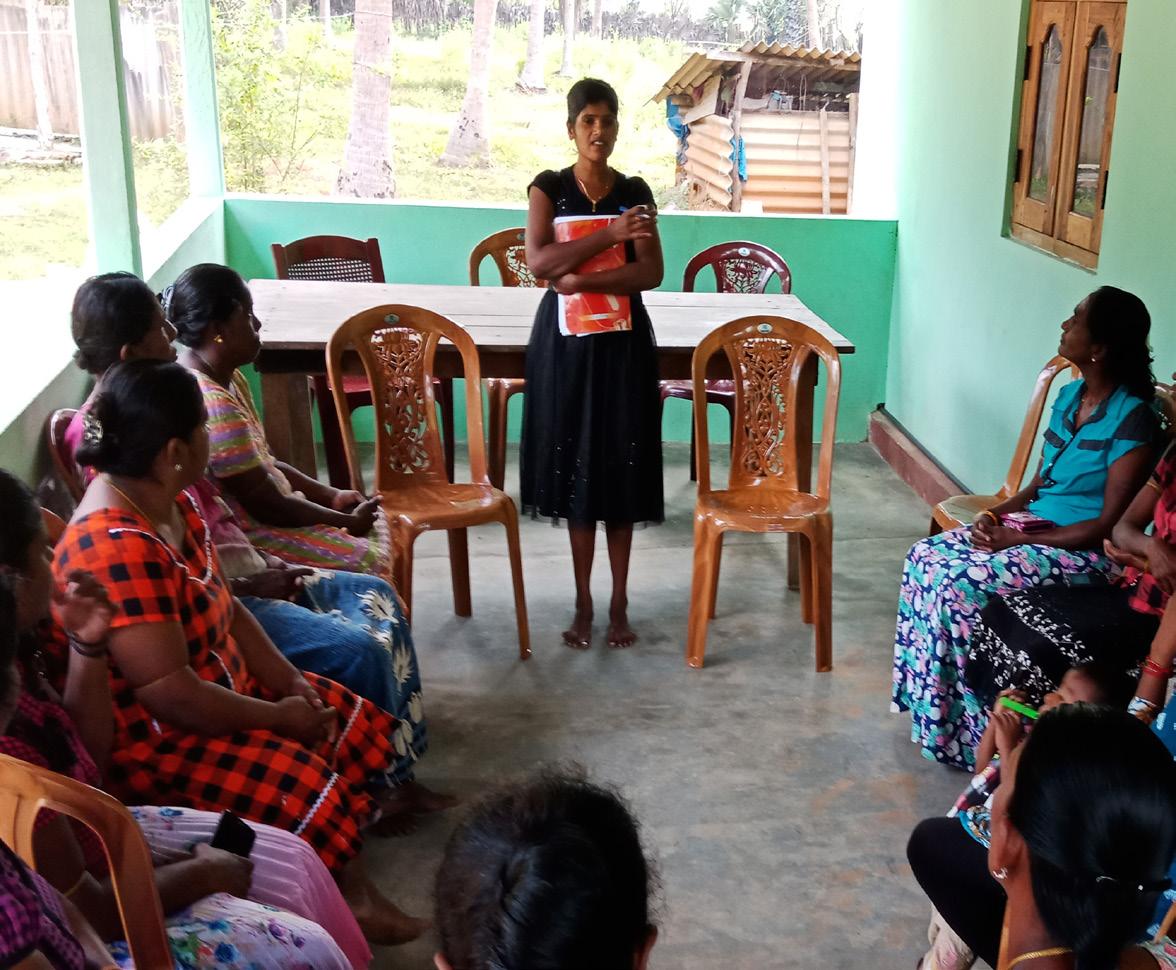
In fact, vocational training is a key piece of redevelopment. Many families were impacted by the war, and many women returned to Iruttumadu as widows. Women, especially widows, were invited to participate in self-help groups to strengthen job and finance skills. There, they learned income-generating activities such as home gardening, compost production, and the cultivation of mahogany trees, which prevent erosion and will sell for a good price once mature. Hiruni, age 32, is one of the women who joined.
Iruttumadu was caught in destruction; now, new life has sprung up across the community. Young people have found hope for stable futures, and many who struggled with alcoholism were able to overcome it with the help of the development program. Gardens overflow with new life—and the community does, too. Gayan, age 36, reflects on the five-year project.
“I want my community to become self-sufficient community,” he explains. “Like what NCM did, I hope someday our community will help another village.”
*Names are changed for safety.
“MY DAUGHTER IS GONE. LET OTHER CHILDREN IN THE VILLAGE ENJOY WHAT SHE HAS LEFT BEHIND.”
Children and young people are changing their futures after surviving war.
Women are unleashing their potential through empowering training and self-help groups.
VOICES
Knowing God’s heart means consistently, radically, and very concretely to announce and reveal that God is love and only love, and that every time fear, isolation, or despair begin to invade the human soul this is not something that comes from God. This sounds very simple and maybe even trite, but very few people know that they are loved without any conditions or limits.
This unconditional and unlimited love is what the evangelist John calls God’s first love. “Let us love,” he says, “because God loved us first” (1 John 4:19). The love that often leaves us doubtful, frustrated, angry, and resentful is the second love, that is to say, the affirmation, affection,
sympathy, encouragement, and support we receive from our parents, teachers, spouses, and friends. We all know how limited, broken, and very fragile that love is. Behind the many expressions of this second love there is always the chance of rejection, withdrawal, punishment, blackmail, violence, and even hatred. ...
The radical good news is that the second love is only a broken reflection of the first love and that the first love is offered to us by a God in whom there are no shadows. Jesus’ heart is the incarnation of the shadow-free first love of God.
 Excerpt from In the Name of Jesus by Henri Nouwen
Excerpt from In the Name of Jesus by Henri Nouwen
40 2023 // ISSUE 1
Go Deeper
READ
In the classic book Compassion: A Reflection on the Christian Life , authors Henri J.M. Nouwen, Donald P. McNeil, and Douglas A. Morrison look at compassion through the lens of God’s love for us and our call to love God and each other in the same way. It moves away from compassion as a reaction of guilt and toward compassion directed by God’s love.
STUDY

Keeping Creation is a 5-week, Scripture-based study that includes a practical application for the call on God’s people to tend to and care for the earth. It looks at how our care for creation impacts people worldwide and how the decisions we make today will impact the world tomorrow. (Written by Caleb Cray Haynes, Ryan Fasani, Megan Pardue, and Todd Womac.)

Available at The Foundry Publishing
WATCH


The Justice Series from Bible Project explores what justice looked like in the Old and New Testaments and discusses practical tips for following the call of Jesus to live out righteousness and justice. This video series addresses how reconciliation, righteousness, and justice are interconnected and crucial aspects of living out our faith. They provide resources for group discussion, personal reflection, and further study.
LISTEN
The Be the Bridge podcast by Latasha Morrison creates space for conversations with leaders around topics such as faith, reconciliation, and bridge-building. Morrison takes the principles from her book with the same title and interviews experts on practical applications for bridgebuilding. She highlights diverse voices and topics to bring real-life applications to faith and reconciliation.

41 NCM.ORG

42 2023 // ISSUE 1
Snapshot
“A life of hospitality begins in worship, with a recognition of God's grace and generosity. Hospitality is not first a duty and responsibility; it is first a response of love and gratitude for God's love and welcome to us.”
-Christine D. Pohl
To read more about how churches are responding to the crisis in Ukraine, turn to page 22.
YOUR SPONSORSHIP UNLEASHES CHILDREN’S POTENTIAL.

For more information about signing up to become a sponsor, visit NCM.ORG/SPONSOR Have questions? Email cs@ncm.org or call 800.310.6362
I would like to sponsor a child for $30 a month: l Yes
I would like to sponsor: l Greatest Need l Boy l Girl
I would like to sponsor a child from:
l Greatest Need l Africa
l Eastern Europe
l Asia l Asia-Pacific l Caribbean
l Latin America
l Middle East
Name / Group
Contact Person (if different)
Address / City / State / ZIP
Phone ________________________________________ Email


Church to receive 10% giving credit
You can mail this form to: Nazarene Compassionate Ministries, Child Sponsorship 17001 Prairie Star Parkway, Lenexa, KS 66220
No payment is due now. You will receive information by mail about the child you sponsor.
43 NCM.ORG
NAZARENE COMPASSIONATE MINISTRIES
BUT IT ALSO SHOWS THEM THEY’RE NOT FORGOTTEN.


Nonprofit Org. U.S. Postage PAID General Board of the Church of the Nazarene
COMPASSIONATE MINISTRIES
of the Nazarene
Prairie Star Pkwy
KS 66220
310-6362
For more information on Child Sponsorship Endowments, which sponsor children in perpetuity, contact the Church of the Nazarene Foundation at 866-273-2549 info@nazarenefoundation.org www.NazareneFoundation.org You can leave a legacy of compassion.
NAZARENE
Church
17001
Lenexa,
(800)
info@ncm.org





























 Nazarenes around the world are both the carers and those cared for.
Nazarenes around the world are both the carers and those cared for.


 A chain of Nazarene churches links people to hope and love across Central America.
Whole families might migrate together, seeking a life that isn't defined by poverty or hunger.
A chain of Nazarene churches links people to hope and love across Central America.
Whole families might migrate together, seeking a life that isn't defined by poverty or hunger.













 BY SANDRA MILENA PEÑA, NCM COLOMBIA
BY SANDRA MILENA PEÑA, NCM COLOMBIA









 In the midst of life-changing access to jobs and food, new friendships and deep relationships with God are flourishing.
In the midst of life-changing access to jobs and food, new friendships and deep relationships with God are flourishing.








 Excerpt from In the Name of Jesus by Henri Nouwen
Excerpt from In the Name of Jesus by Henri Nouwen










